#and thus their souls cease to exist
Text
1.0 making Direct Eye Contact and breathing heavily while [redacted] makes a giant mess of her house like
#6.4 spoilers#let’s just say if eyrie hadn’t succeeded then everyone would have to get real okay with some Real Fucksd#*Fucked Up Stuff#love to see something terrible like the Caretaker of the Mother rise from the bottom dredges of the aetherial sea#to just. grab and devour athena whole#i was thinking about it in the car how 1.0 does change after emet arrives in the aetherial sea#she was just a caretaker of the mother + her being fragmented parts of charon#but she ends up embodying Hades as well—the shepherd across the river but also that which waits on the other side#the one who sings the final verse for these people#the caretaker of the dead to eyrie’s shepherd of life#a bit more primordial since she transcends hydaelyn and emet’s roles in the aetherial sea#but she has the ability to eat souls—to consume all that makes a person#down to the floating scraps that drift she will consume them all#and thus their souls cease to exist#it’s not pleasant for her to do but it’s something she can#but she would consume athena to save the world#she does it anyway when what came of her rebirth drips down to the depths#1.0 is just a bit upset about how slippery she was to have evaded her#and thus she pays the price of denying death her due#and she gets eaten. every last bit of her soul#see i stick the weird in 1.0 so eyrie can be…..reasonably normal#oc: eyrie kisne
1 note
·
View note
Text
With Walpurgisnacht Rising coming in 2024, I want to talk about something that has been bothering me since Rebellion. It was never the “plot twist” of Homura separating Madoka from her godhood nor her taking those godlike powers for herself thus becoming the devil. It was always people's reactions to Homura doing this and the way they based her entire character around this specific moment that really rubbed me the wrong way. Saying she's a selfish monster who's trapping Madoka in a fake world for her own personal gain or that she's taking Madoka's agency away from her and making decisions for her that directly rebel against what Madoka wants... And, to that, I just want to know.... do literally any of you know what Madoka actually wants or are you just basing her character around her sacrifice?
Yes, it was for the benefit of all Magical Girls and yes it freed them from their cycle of selling their souls in the name of hope just to die at the hands of their own grief and despair, but Madoka didn't plan to abruptly cease to exist at the cost of it?? She didn't want to be stuck between life and death only existing as a deity meant to eradicate Witches for all of time. Madoka wished to erase Witches before they are born from the past, present, and future. Going back years upon years in time, destroying Witches and mercy killing Magical Girls; fighting forever, past and future, for all time. Ceasing to exist as an individual, only able to materialize and interact with someone when they're dying of grief and sadness and pain; relieving them of that pain so that their last moments won't be in agony, so they can die in peace, but there's none of that for Madoka. There's no death, no closure, no release, no freedom from this hell of being a weapon and nothing more.
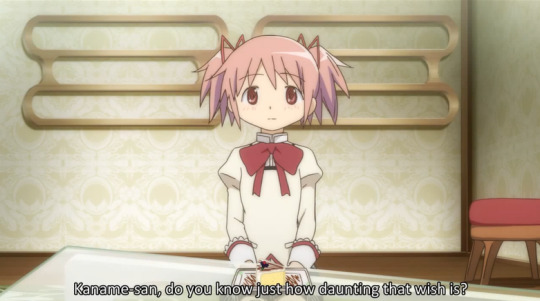
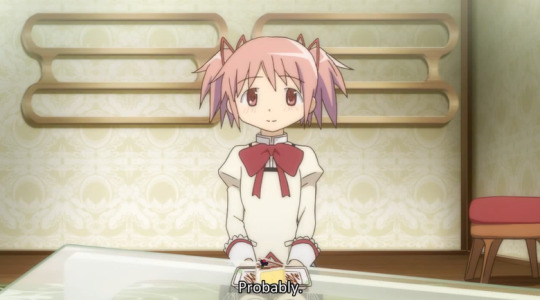
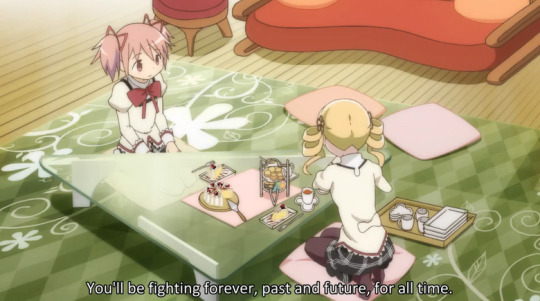
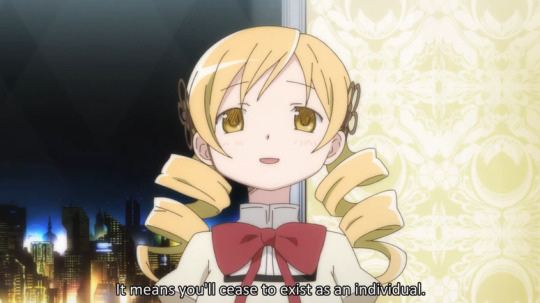
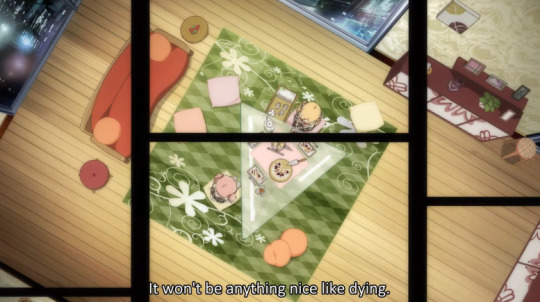
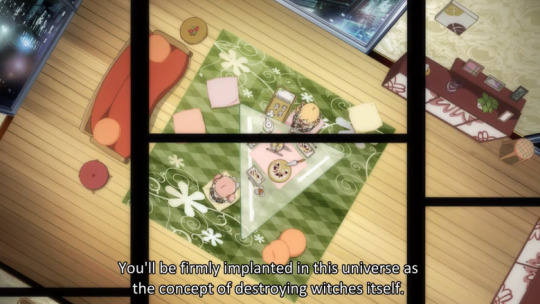
But, Madoka would never voice these struggles and frustrations. Because Madoka isn't that kind of girl. She's the kind of girl who shoves all of her problems down and bases all of her self worth on how much she can do for others, how happy she can make others, and how useful she can be. She forces a smile and masks her pain because she doesn't want to burden anyone with her problems. She puts herself down constantly, risking her life trying to help others because she cares so little for herself. Without being useful, she believes her life has no value. And Homura knows this. Because Homura knows her. I feel like most people take Madoka's bright pink colors and smile at face value and don't realize she's chronically depressed. That's why in the first timeline, she and Homura naturally got along so well: they were both girls who hated themselves and based their self worth on how they made others around them feel, both self-loathing girls who deem themselves worthless if they're not useful in some way. Madoka was just better at hiding it than Homura was. And she still is by the 100th loop.
But, in Rebellion, when her memories of being a god are taken away from her, and she's given a hypothetical scenario of her fate, she says "wow that sounds awful and scary and lonely and I would never do something like that." The Flower Field scene is one of the most brilliant and misunderstood scenes in all of anime. Majority still to this day argue that, since Madoka doesn't have her memories, her words hold little to no weight, and Homura is simply hearing what she wants to hear. So, naturally, they disregard what Madoka is saying, assuming it's just Homura being selfish. And that's where they mess up. Because, the fact that Madoka doesn't have her memories here is the whole point! Homura is already well-aware that if Madoka had her memories, her self loathing would result in her caring so little for herself that she sacrifices herself every time which is why immediately after Madoka's words, she assures Madoka that she is indeed "strong enough to make that decision." Homura just wanted to confirm if Madoka would still miss her life pre-godhood in spite of that, which she outright says she does.
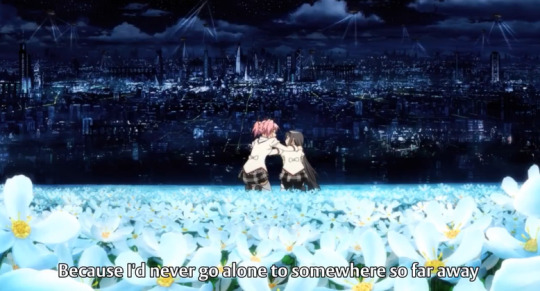
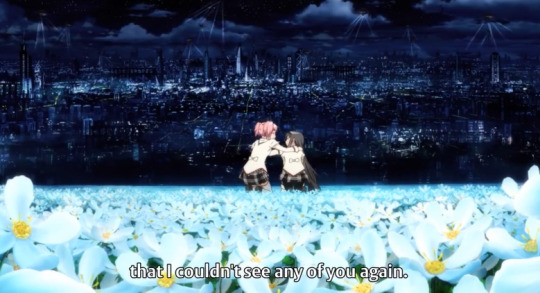
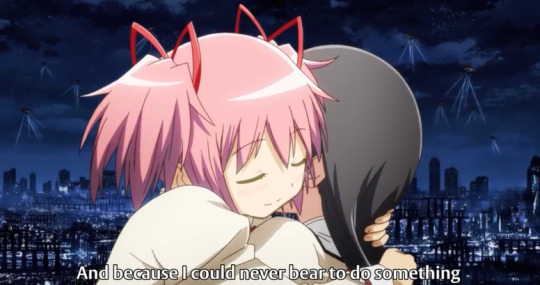
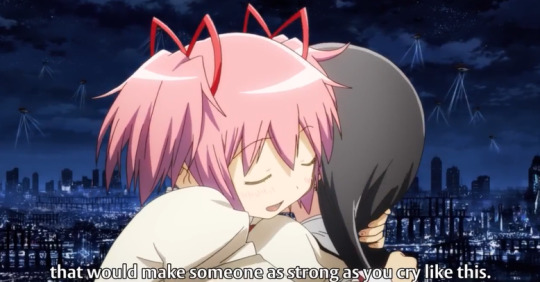

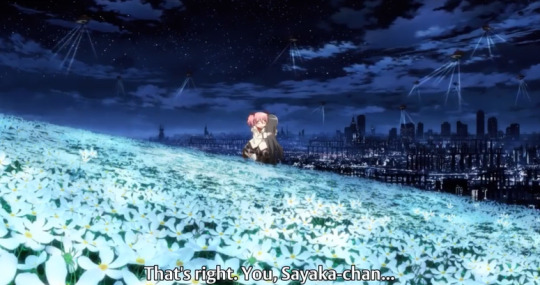
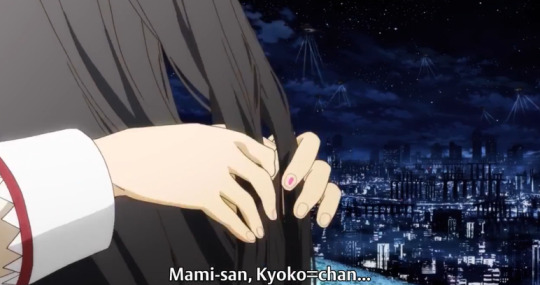
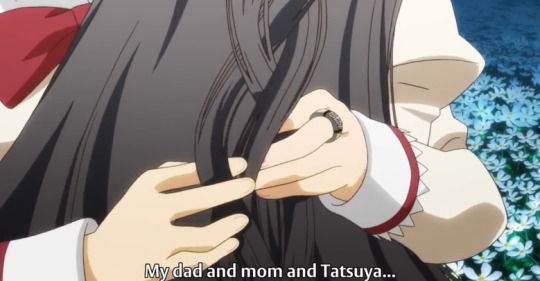
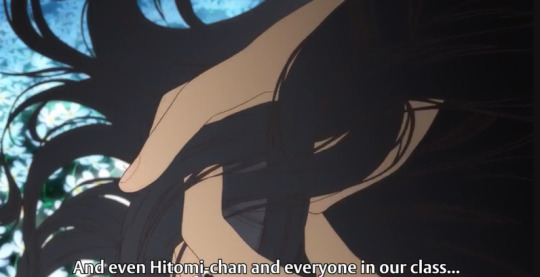
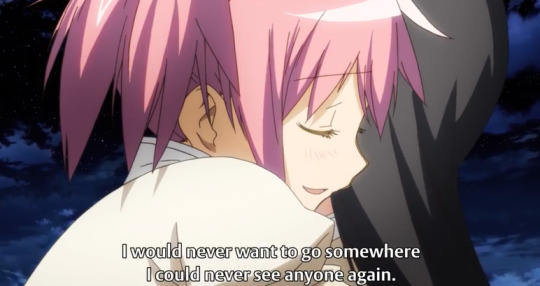
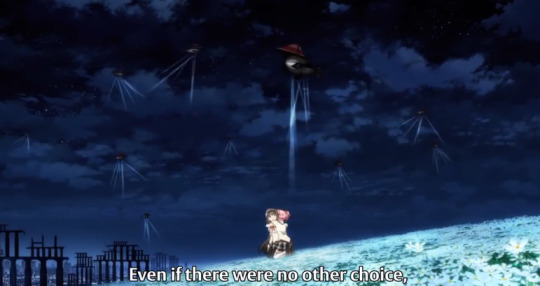
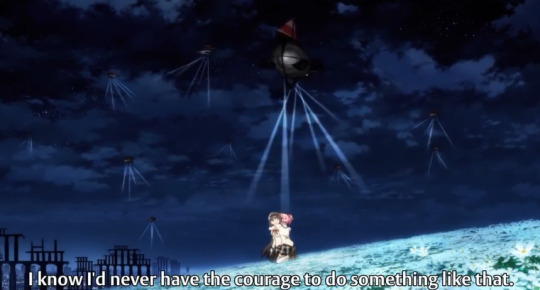
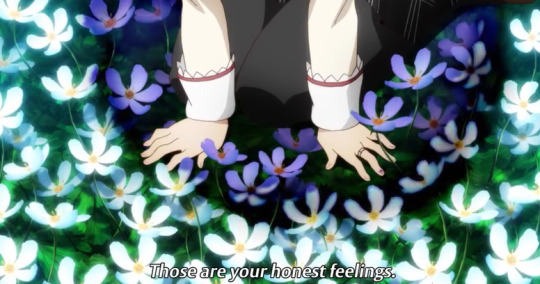
There are also arguments that Homura was somehow influencing Madoka in the labyrinth aside from just not remembering becoming a god, but Shinbou already stated in an interview that this wasn't the case, and that these were Madoka's honest words. In fact, Madoka's true feelings regarding her godhood are revealed for the first time within the lyrics of Madoka's character song (sung by her VA Aoi Yuuki) that played as the ep 1-2 ED titled “Mata Ashita”. The song is about Madoka post-series which consists of Madoka wandering around aimlessly, quietly observing as humanity resumes without her, lamenting on the life she lost after becoming a god and wishing she could have been more honest about her feelings to Homura in ep 12, asking her to realize she's lonely.
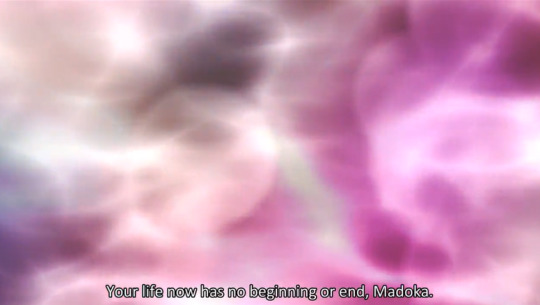
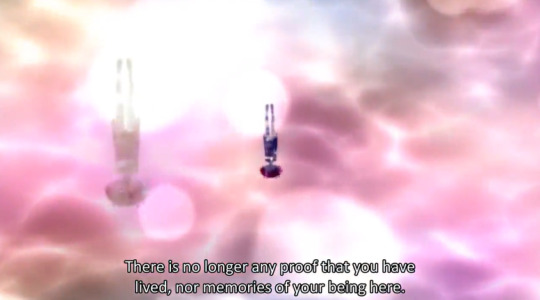
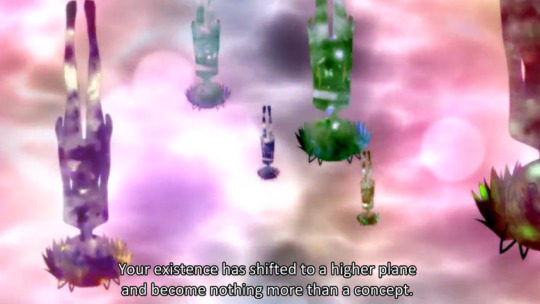
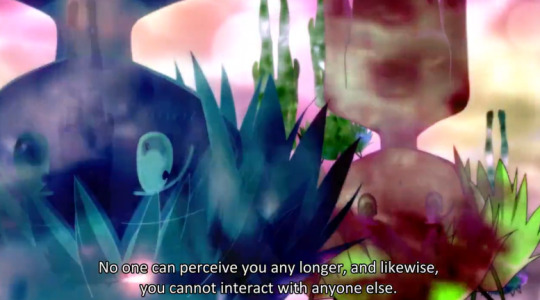
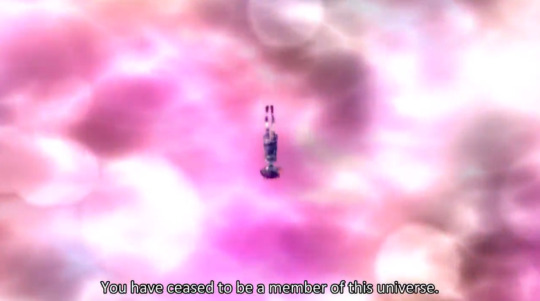
[I'm pretending that I'm used to being alone, but I'm not really that strong.
The scenery is the same as always, the city is the same as always.
Even though I think everything will stay unchanged.
I still feel like I'm the only one who's tiny. Instead of "See you later."
I should've said, "I'll stay for a little longer."
I wanted and hoped that you would realize it.
But with the words "See you later,"
I lie to myself again.
And hide my true feelings beneath my usual smile. Saying, "See you later," I wave my hand.
Cracking a smile, yet I'm feeling lonely.
The truth is, I still have more to talk about.
But even my voice saying, "See you later"
is so near yet far from you that it can't reach you.
So let me say this like I always do, just once more: "See you tomorrow"]
This is definitive proof that even BEFORE Rebellion, this was already confirmed to be Madoka's true feelings.
The second time Madoka's true feelings post-godhood are adressed is via Madoka and Homura's concept movie quotes explaining that the God (Madoka) is clearly suffering in her “heaven”, which is more like a prison of isolation. The lizard girl (Homura) takes pity on her and separates her humanity from her godhood, thus making her human once more. Here are also some direct quotes from Magia Record which provides even more context for what Madokami is experiencing:
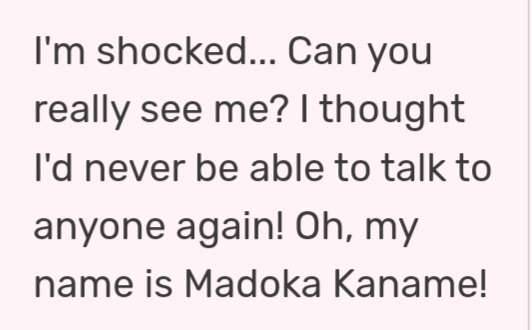
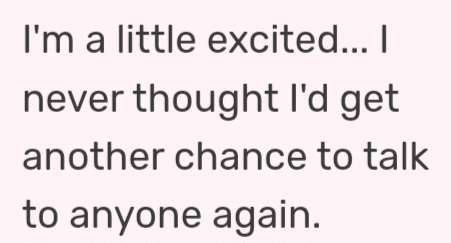
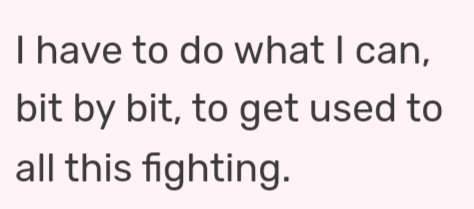
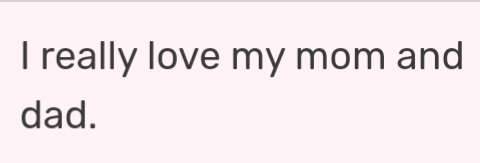
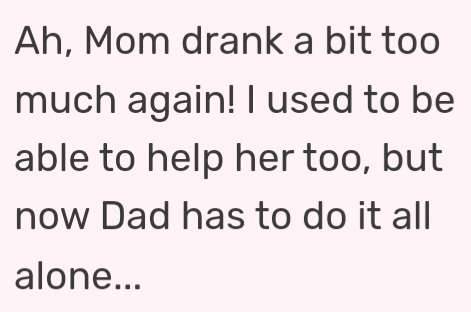
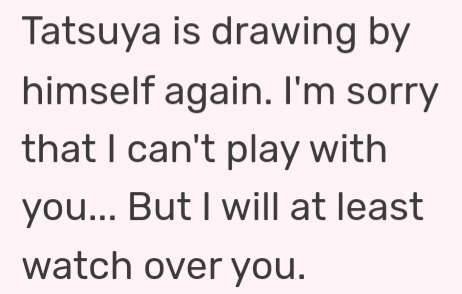
All of this, with the addition of Madoka's words in the Flower Field scene being confirmed to be her real and honest feelings, puts the whole “pulling madokami down from heaven” scene into a different perspective. Considering the entire reason why Madoka even became powerful enough to become God in the first place was because Homura's 100+ time loops linked multiple parallel universes together with Madoka at their center, and it's confirmed Madoka was suffering as a god, I would think people would be happy to see Homura reverting Madoka back to a human being and rewriting the entire universe to be a world where Madoka is happy and free, surrounded by her friends and family???
The fact that Homura's love for Madoka was so strong throughout 12 years of 100+ time loops, it turned Madoka into a goddess but when Homura was able to see just how isolating and lonely godhood was for her, she took her godlike powers for herself because she loved her and was willing to take on the exhaustion and isolation of immortality as the devil to spare her of anymore pain and sadness. Homura freed Madoka from a nonexistential purgatory prison and a decade later she's still demonized for it, how insane is that??
#pmmm#pmmm rebellion#pmmm walpurgisnacht rising#pmmm walpurgisnacht no kaiten#puella magi madoka magica#madoka magica#madoka magica rebellion#madomagi#mahou shoujo madoka magica#madoka kamane#homura akemi#madoka x homura#homura x madoka#madokami#homucifer#akuma homura#ultimate madoka#i dont want to see not ONE “oh but she still shouldn't have done it because it's not her decision to make it's madoka's” argument#what the fuck is madoka meant to do?? she is literally stuck.#“b-but what about all the other magical girls??” what about madoka. it seems like homura is the only person to consider madoka's feelings#and yet ppl villainized her for it. called her a perverted freak who was trapping madoka in a cage like how fucking dare you#for an entire decade homura has been demonized for loving madoka when the entirety of madoka magica is homura's love letter to her#homura did nothing wrong gang this is for you and for me#homura did nothing wrong#and i stand by that idfc#court is adjourned#madohomu#cw long post#not tagging this as an analysis bc this is all material straight from the source and it doesn't get more canon than that
682 notes
·
View notes
Text
A Refuge in the Afterlife?
DPxDC Crossover prompt
One day a message from space is sent to Earth, a call for assistance for the last survivors of a destroyed planet. The Justice League, of course, receive this message and a Team sets out to make contact with the group, ready to offer them whatever supplies they need and perhaps a location to rehome themselves.
Among this team would be one of the Green Lanterns, Guy or Hal, who are of course curious about why this group sought out Earth specifically instead of reaching out to the Corps? The answer to that question being quite simple:
To save the souls of their dead.
As it turns out, with the destruction of their Home World the survivors believe that not only are they at risk of becoming lost souls upon their own deaths, but the very Afterlife dimension that was attached to their world is at risk of ceasing to exist unless they find another world whose Afterlife can take theirs in as well, combing the two as one.
And wouldn't you know it, the surviving priests and/or mystics have received word from their endangered Ancestors that the Earth has a King of the Infinite Realms who may be willing to do just that. Once they reach the planet, they would be so grateful if the Justice League would be willing to help them petition this King for asylum for their people, both dead and alive.
The only problem?
This is the first time anybody from the League has even heard of this so-called King, and now everybody's scrambling to find out whatever they can about this being. And what little they are finding is nothing short of alarming. A mad tyrant who tried to invade the living world?! Yeah, they need to get on top of this fast, before the Refugees arrive!
Meanwhile, Danny just felt a shiver run up his spine and wonders if it's because his dad's latest batch of fudge came out a little too ecto-contaminated.
(Spoilers: it wasn't the fudge).
My personal Head-canon when it comes to the infinite Realms: the reason why we don't see any other religious figures or alien beings, is because Pariah Dark screwed up relations so bad with the other afterlife realms that the infinite realms has become largely cut off from everything else but Earth. Too much greed and trying to conquer shit to be considered a good neighbor, even by demon standards. Doesn't even matter that Pariah's been sealed away, it's still his dimension as long as he exists, and the absolutely hostile environment and denizens there prove it.
The word of today that inspired this post is Syncretism: (via wikipedia) the practice of combining different beliefs and various schools of thought. Syncretism involves the merging or assimilation of several originally discrete traditions, especially in the theology and mythology of religion, thus asserting an underlying unity and allowing for an inclusive approach to other faiths.
#Danny Phantom#Detective Comics#DC#DPXDC#Syncretism#Crossover#Alien Refugees#Afterlife#mine#Not Phantom Planet compliant#Danny doesn't even know that he's now considered the Ghost King#Now take a second and remember that the DC universe has had numerous planets get destroyed for one reason or another#Quite a few of the heroes and villains have origin stories of being among the last of their kind depending on which DC universe your in#like Superman or Starfire or Martian Manhunter#Now imagine them finding out this particular aspect of Afterlife lore is actually a thing#and promptly having a major freakout wondering if the souls of their dead are in danger as well#And may possibly be saved as well if they are#Anti-Ecto Acts?#Oop better get rid of that shit right away.#Pariah would be so pissed to find out that his unwanted successor was expanding the realms and wasn't getting any flak for it#“I was trying to do the same thing and I got put in time out!”#No honey. You were trying to conquer the Living world to expand your power.#Risking the destruction of both dimensions#You are not the same
104 notes
·
View notes
Text
one thing i like to do when i'm feeling too unbothered and chill and normal is read venat discourse on twitter. makes me insane every single time it comes up. "she placed herself as a god above the ancients and judged that they had no right to live" "she was taking the only path available to her to stop meteion and defeat the final days because it needed to be a race that could handle dynamis" wrong wrong wrong! learn to read!
venat was stopping a planned mass sacrifice of non-ancient life by the only means available to her. that is the primary motivation for the sundering. shadowbringers says this to you, very very clearly. hythlodaeus in "a greater purpose," 5.0 (this is when you're chilling at the DMV together):
The Convocation of Fourteen─well, it was Thirteen at the time─endeavored to create a will for our star. They would repair the fundamental laws of order and halt the spread of destruction. But creation on such a scale required an immense source of power... Of those of us who still lived, nearly half offered up their lives in the name of salvation. And from their sacrifice, Zodiark was born. Just as we had hoped, He reached forth and halted the march of oblivion. ...Yet oh how the star had suffered. So many species lost. The land was blighted, the waters poisoned, and even the wind had ceased to blow. Once more did our people give of themselves to Zodiark. Another half of our race sacrificed to cleanse the world; to ensure that trees and grasses and myriad tiny lives would sprout and grow and flourish. The cycle of life had begun anew, and we reconsidered the means by which we might protect it. The Convocation decided thus: we would nurture our world until it was bursting with vitality. Then, when the time was right, we would offer some portion of its living energy to Zodiark... In return, He would restore to us those brethren whose souls had fed His strength, and together we would resume our role as stewards. There were, however, those who disagreed with this plan. They argued that enough had been sacrificed to Zodiark─that this new world should belong to the lives newly born. These dissidents surrendered their life energies in the creation of Hydaelyn, an incarnation of their opposing belief. And for the first time in history, our people stood divided... Know you, then, how this conflict ended?
Hythlodaeus is very clear: Following the first 50% sacrifice to Zodiark, the land was dying and there had been a mass die-off. A second 50% sacrifice (so 25% of the pre-Zodiark Ancient population) resolved that, cleansing the world and restoring nature and non-Ancient life. Afterwards, the Convocation planned a third sacrifice: they would "nurture [the] world until it was bursting with vitality," the "trees and grasses and myriad tiny lives" he describes earlier, and then sacrifice some considerable amount of that life to restore the Ancients comprising Zodiark.
People pretend that there's a lot more ambiguity on this point than there is, but it's quite clear that when he says "myriad tiny lives," he is saying something that encompasses the modern peoples of Eorzea or their very near ancestors (it's only been about 12,000 years since the Sundering. For comparison early modern humans emerged about 300,000 years ago, and there's no suggestion I'm aware of that evolution even exists on Etheirys anyhow). There's a couple very strong pieces of evidence for this:
First, anything that exists on multiple shards must have existed pre-Sundering, since there's close to no multidimensional travel (barring Ascians and the Exarch). Thus, all the player races, which we know exist on each shard so far, as well as, say, the Amalj'aa, the Kobolds, the Sahagin, and the Qiqirn, all must have existed before the Sundering since we also see them on the First.
Second, the phrasing of "trees and grasses and myriad tiny lives" positions "lives" as a category that encompasses everything that isn't trees and grasses. We can surmise that when he describes the Hydaelyn faction standing for "lives newly born" he's again describing basically everything that isn't plants. this again includes the spoken races of the current game or their ancestors; they are a clear part of what was at stake in the sacrifice.
Third, if that doesn't persuade you that Hythlodaeus is talking about lives like yours, consider that you've just spent the last few quests exploring the city full of giant ancient magic people going "wow! you're so small and childlike! what a miniscule living being you are!" When Hythlodaeus gives this speech about "myriad tiny lives," he is a literal enormous giant sitting next to you, a very tiny living being from his perspective.
This sacrifice, which Hythlodaeus explains to you in the DMV, is the crux of the matter and the root of Venat's choice. The time loop, her knowledge of Meteion, the debate over the right solution to the final days—all of that is secondary. She explicitly is unsure up until you meet her in the Aitiascope whether the time loop is stable and real and applies to you.
The essential issue is the fact that the Ancients are supposed to be stewards of the star, and now they are going to engage in mass sacrifice of lives that Venat knows are people like her and her peers (mostly this is thanks to being a humanist who believes in the sanctity and dignity of life but she also has the confirmation of your post-sundering, totally humanlike existence). Just a quarter of the Ancients' original number remain, their society is in tatters, and what's left is in the process of actively betraying every ideal they ever claimed to hold by slaughtering the life they allegedly guide and care for (which they know to be ensouled!) to undo the great and noble sacrifice of their loved ones.
but venat's faction is weak. it's her and like 13 sorta-important people she knows plus maybe some unnamed others. they lack the numbers or the raw ability to make something that can defeat zodiark, and will need instead to lean on venat's abilities.
her morals do not allow her to stand by as the convocation plans a mass sacrifice of "lesser" life. her circumstances do not give her the time or ability to win them over through rhetoric or decisively defeat them with force. nor can she actually destroy zodiark, because then the final days would simply resume. nor, I assume, is she interested in straight up slaughtering what remains of the ancients until the convocation's plan becomes impractical, assuming she is even strong enough to do so with just the twelve and the watcher's ancient selves for backup. there is no longer an option on the table which does not involve great pain. left to choose between unacceptable options, she chooses the one route which seems able to protect the vitality of the world and uphold the ancients' mission of shepherding all life upon the star towards flourishing: the sundering.
34 notes
·
View notes
Text
ozma's reincarnation differs from ascension bc the god of light is just incredibly rule-bound and finds balance the most important thing in the world.
like. the gods introduced death to the ever after by making the jabberwalker, and in light's mind that broke the ever after's balance so much that he wanted to get rid of it and thus keep the ever after as it was. dark argued against him—they shouldn't punish their creations for their mistakes—and it's an argument that he by all means won, since the jabberwalker still existed after they left.
when they made remnant, they also came up with a bunch of rules that they both then agreed upon. now, death is and always has been a natural part of life. it's part of remnant's balance. so when dark breaks that balance—breaks the rules they together agreed upon—light obviously doesn't stand for it; you can't just break the rules.
in a sense—as odd as it may sound—ozma's reincarnation... still follows those rules. in the most loop-holey way possible, yes, but it does. who knows exactly where their soul goes when a person dies—we know there's an afterlife, so safe to say the souls of the dead continue on 'living'—, but their body no longer lives. there's no bringing someone back as they were, or remaking them into something slightly different but still recognizable. that body is not getting back up again.
and that's the case with ozma. his body is gone. when he reincarnates, it's not into a body that didn't exist before, it's into an already living person who has their own life. the balance is kept because it's not ozma being brought back to life in the most literal sense... it's ozma's soul that never ceased to exist in the first place hitching a ride in someone else's body.
i don't know if i'm explaining this in the best way possible, but when you get to the nitty-gritty details of things... it makes sense based on what we know about light. like, it's not that hypocritical, cos technically he's not breaking the rules. he found a loop-hole. and for that reason i don't think he's like. gung-ho about death having to exist—he introduced it to the ever after in the first place and then wanted to get rid of it because balance—or that he has a problem with ascension.
he just really, really cares about rules and balance, and he operates in a way that makes sense based on the rules the world he's inhabiting has.
#rwby#and it's that that makes light seem cold uncaring and unapproachable#while dark just goes YOLO and does what he wants (for better or worse)#and is also more willing to understand instead of stonewalling someone bc Rules™
118 notes
·
View notes
Text
So I finally made a slightly comprehendible list of my most common Lord OCs. Here's my powerful babies.
Lord Selene (Lord Moon. Companion is Luna, his Lunar.) Loves candy and is very socially anxious because his star wiped half his personality and most of his memories in the wipe.
Lord Hypernova (Lord Kill Code. Companion is Void, his Moon.) 30' tall megalith of an animatronic. Is a safe haven for dimension travelers and has a soft spot for versions of his children from other dimensions.
Lord Pulsar (Lord Eclipse. Companions are his Sun, Dawn, and an Eclipse from another world, Magnetar.) Age regresses, becoming quite kind due to Magnetar's influence. Loves cotton candy.
Lord Artemis (Lord Blood Moon. Companion is Telesto, his Moon.) Very kind, very depressed. Still traumatized and depressed from his twin dying in the star going off. Loves all travelers, though his universe is not particularly safe for them at most times with random spatial jolts.
Lord Styx (Lord Harvest Moon. Companion is Nyx, his Eclipse.) A mean son of a bitch at first. Gets better once he realizes Nyx has no memory. He's very sassy and snarky but kind to those who he was close to before the star went off (Lunars and Blood Moons).
Lord Luminous (Lord Lunar. Companions are all of his family; Incandescent [Sun], Phosphorescent [Moon], Fluorescent [Eclipse], Iridescent [Blood Moon], Opalescent [Harvest Moon], and Pearlescent [Kill Code].) An abusive asshole at first but, once confronted with his abuse of his companions, Luminous becomes much kinder and willing to cooperate and try to undo the century of abuse he put them through. Loves spicy food, does the one chip challenge like they're doritos.
Lord Fractal [yep I made a new one again] (Lord Solar. Companion is no-one.) Lord Fractal took in Lunar's star power in a desperate attempt to save Lunar from judgment by the Astral Bodies, which caused the powers to go haywire and wipe the universe. Lord Fractal existed in a small corner of his universe for fifty-three years in a 'paradise' where his family was no longer dead, though it was only an illusion. After those fifty-three years, he realized he was in an illusion of his own making and used his star powers to create a world for him to live on rather than floating in space (though he can't figure out how to recreate his family). Fractal is a very lonely soul simply going through the motions of his old life with his star powers giving him whispers of the life he used to have and illusions of the family he lost when his star power went haywire.
Lord Albedo [yes, yet another one] (Lord Ruin. Companion is his, Astronomy, his Solar.) Albedo became a Lord entirely by accident. When Lunar killed Eclipse 3.0, Ruin was much too close and ended up taking in some of Lunar's star power, thus leading the Astral Bodies to attempt to eliminate Albedo as a potential threat. However, the elimination went wrong, very wrong. When the Astral Bodies attempted to kill Albedo, the star power that Albedo had absorbed continued to absorb the Astral bodies' powers as well until all beings with star power ceased to exist. Because of this attempt on his life, Lord Albedo had a mental breakdown, which unleashed the star power he had absorbed into a destructive wave that wiped the universe of all but Astronomy, who was attempting to calm Albedo down at the time. Albedo has regular panic attacks, which Astronomy usually helps calm him down from. He's very anxious and traumatized, but Astronomy acts as his bodyguard and best friend to help Albedo feel safer and less stressed, since too much stress could potentially cause another wipe of the universe.
#sun and moon show#sams#five nights at freddy's#fnaf#lord selene#lord hypernova#lord pulsar#lord artemis#lord styx#lord luminous#lord fractal#lord albedo#snoweytrashposts#snoweytalks#snoweyrambles#snoweyrants#au lore drop#tw amnesia mention#tw cursing#tw abuse mention#tw trauma mention#tw death mention#i still don't have a decent lord sun#rip me#queue#queued for 5pm 3/12/24
24 notes
·
View notes
Note
I've been thinking a lot about your circle/bowl analogy and ultimately I think this is fundamentally incorrect, and a bad analogy. The mathematical construct of a circle only has real "existence" when instantiated in the form of an object, but the human spirit (or "soul", the immaterial part of a person) is not an abstract concept like a circle, but a real spiritual object. If the soul didn't have existence outside of its instantiation in physical form, then humans would cease to exist between death and the resurrection. Also, the soul can be expressed imperfectly by the body. If the soul and body were 1-1, you'd lose a part of your soul when you take brain damage.
In reference to this post.
I stated in the post that it wasn't a perfect comparison (I borrowed it from Aristotle, who used it to rebut Plato's more gnostic ideas about Forms), and that the soul is spiritually real. The point of the answer was to demonstrate that many things which exist on a different plane, such as the spiritual or mathematical, must manifest physically to be understood, experienced, or fulfilled.
I know that when I die, my soul will go to heaven while my body remains on earth. Do I understand what that will look like or how I will experience that? No. I could not possibly. It is beyond my comprehension.
I also never said that the soul is perfectly expressed in our bodies. We live in a fallen world, and thus both our bodies and our souls are imperfect; and as anyone who has met a very healthy and beautiful narcissist knows, their flaws aren't usually mapped over each other.
I also don't think this analogy necessitates that brain damage would "lose" you part of your soul, but I think you'd be hard pressed to find anyone who does not concede that brain damage changes or affects the soul, just like any injury does. The body and soul are a union, and even doctors and scientists cannot conceive of where one begins and the other ends, or which one is affecting the other in a given circumstance, so they dispense with the idea of the soul at all.
What I am talking about is the soul-body wholeness we will have after glory, that Adam and Eve had before the Fall. The human being factory settings. Because it is a bodily resurrection we will experience, we will necessarily retain our physical sexes, just as Jesus did. And even though we will no longer be multiplying in the New Earth, the complementarity of the sexes still glorifies God in its beauty and depicts His image within us.
20 notes
·
View notes
Text
xiao — and the wind might forget ☆彡
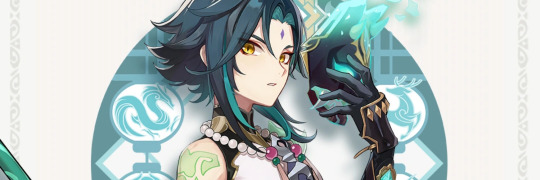
summary — and though the wind may forget you but he never will.
pairing — xiao/gender-neutral reader
tags — angst probably but its really small i think ; one-shot
words — 764
note — i saw the dialogue or saying on a tiktok and an idea occurred to me

"Within 3 months, your skin cells will regenerate and get replaced by new ones."
Where has Xiao heard that notion before? Was it when he accidentally listened to one of the conversations of a group of people residing and drinking in the inn? Was it when he passed by strangers joyfully talking to each other while holding one another's hand? Was it perhaps from one of the people who he is familiar and acquainted with? Or was it from you whose voice he had not heard after a long time and he yearned to listen to it once again?
Perhaps, he will never know the answer to that question so he didn't bother thinking much about it, the gained knowledge and information only persisting inside his head as he walks—with no particular destination in mind, only merely following where his feet will bring him— through the silent plains of Liyue, adorned with grass and flowers while butterflies flutter their wings around it; everything on his body will soon forget what you feel like.
In just a few months, a measly amount of 90 days, his skin will forget the way you caress him, the warmth of your palm against his, the softness of your touch, and the tenderness of your love conveyed by each tip of your fingers. But not his mind, his mind will always remember as you remain always in his thoughts. You were the embodiment of his soul, the essence of his being, his other half—thus without you, he will never feel whole and perhaps, he will never be ever again.
He arrives in front of a carved stone with a wilted bouquet of flowers in front of it, seemingly untouched and unmoved.
Of course, this is where his unconscious and aimless wandering around, with only the unknown urges of his mind and feet coordinating with each other, will bring him—always back to you whether to your arms or to your grave.
But honestly what would he expect when he has a fresh and new bouquet of your favorite, in various colors and arranged beautifully as it was tendered to by his own touch, on his hand—and his heart on the other—He just couldn't blame himself or anything for finding himself back to this place once again no matter the amount of times he turns away to avoid going down the path back to you.
And so he sits but in silence once again. He has so much to tell you, so many thoughts running inside his brain, but he remains quiet. It's not because his mouth refuses to open and speak his truth but perhaps he finds more peace in keeping them all in his tongue even if it feels like shards on his throat, he finds more tranquility in the stillness of the moment accompanied with his loud thoughts rather than the instance he’ll open his mouth to spill out the words he kept on the bottom of his lungs for the longest time.
A breeze with an absence of warmth in it as if reminding him of the horrors, the grief, and the sorrows of you.
And though the wind may forget the way it blows a breeze against you, the way it wraps you in a cold embrace during the night you are outside, the way your hair flutters in the air against it, and the way it carries small parts of you, it might forget everything but he will never.
He could never forget you, even after 3 months, even after years or centuries, maybe not even for once will he ever forget you. He might live for long, he might forget what you look like, whose face would only be appearing like a blurred photograph in his head, nor will he forget how to utter his name, but he will never forget you, his soul will never forget the way you feel entangled and intertwined with his—you still are bound to his being, finding you everywhere he have never been all at once—and never will his thoughts forget what it feels like to be filled by you.
But when he ceases to exist, what will remain? What parts of you will stay that will walk on dirt? When he has sunk to the ground and when he has withered to little but nothing, what will happen to you? Who will remember you and him and the moments shared between you two?
Perhaps the answer will only be left as if dust settled in the corner of his room, there but unnoticed—seemingly forgotten as time passes.

© azullumi — do not plagiarize, copy, repost, nor translate any of my works.
#yae publishing house#genshin xiao#xiao#xiao x you#xiao x reader#genshin impact fanfics#genshin impact x reader#genshin x reader#genshin impact#genshin fanfic#genshin#genshin imagines#genshin x you#adeptus xiao#genshin angst#xiao angst#genshin impact angst#azul.writes
213 notes
·
View notes
Text
Jewish Song of the Day #40: Rabbi Shimon Bar Yochai
youtube
Comments:
Okay so this one is a little tricky to explain the context of, because it requires a certain baseline of existing knowledge, but I'm gonna try.
So this is a Lag b'Omer song, for reasons I will get to momentarily.
Lag b'Omer is the 33rd day in the counting cycle of the Omer - the 49 days between the second day of Passover (Pesach) and the holiday of Shavuot, which commemorates the giving of the Torah to the Jewish people by Hashem from Mt. Sinai.
Lag b'Omer is celebrated for a couple of reasons:
Rabbi Shimon bar Yochai, who lived in the second century of the Common Era, was the first to publicly teach the mystical dimension of the Torah known as the Kabbalah, and is the author of the classic text of Kabbalah, the Zohar. On the day of his passing, Rabbi Shimon instructed his disciples to mark the date as “the day of my joy.”
The chassidic masters explain that the final day of a righteous person’s earthly life marks the point at which all their deeds, teachings and work achieve their culminating perfection and the zenith of their impact upon our lives. So each Lag BaOmer, we celebrate Rabbi Shimon’s life and the revelation of the esoteric soul of Torah.
Lag BaOmer also commemorates another joyous event. The Talmud relates that in the weeks between the Jewish holidays of Passover and Shavuot, a plague raged among the disciples of the great sage Rabbi Akiva (teacher of Rabbi Shimon bar Yochai), “because they did not act respectfully towards each other.” These weeks are therefore observed as a period of mourning, with various joyous activities proscribed by law and custom. On Lag BaOmer the deaths ceased. Thus, Lag BaOmer also carries the theme of loving and respecting one’s fellow (ahavat Yisrael).
(Source: Chabad - read more about it here)
Because of this, Rabbi Shimon bar Yochai is associated with the day, and therefore this song exists.
It is also worth noting that the first 32 days of the Omer (also referred to as the sephira) traditional Jews observe a number of mourning customs, including restrictions on music. I typically observe some level of this, so JSOTD might go on hiatus for that month, or at a minimum, might switch to a capella music only. I might also switch to doing a "Jewish Teaching of the Day" instead. Please let me know what y'all think in the notes. There is also another similar three week period during the summer months of Tammuz and Av where mourning customs are observed. I will likely do the same thing during both.
The Omer doesn’t occur until early May, but I figured I'd give a heads-up while I am talking about this anyway.
Enjoy the song and let me know your thoughts!
26 notes
·
View notes
Text

Cover art by @/crazycookiemaniac
Summary: The strings of Fate continue to twist and turn and wind in a rather odd manner. It's almost like the fate of the world would be dependent on just a few of the threads. Is there a chance to affect the way they are woven together?
And how about the formerly so happy couple? All they carry of the other as of now, is the tender, but bittersweet emotions in their hearts, along with the rings on their fingers. Rings, which held a spell.
Pairing: Fuegoleon (CC) x Solara (OC)
Fanfic type: Book/long fic
Warnings: Mostly canon typical content, the battle/war themes are there, angst, Fue's fear manifests as anger (he's only human, after all), Solara is still pregnant so themes of pregnancy
Tag list: @succulentsunrise @loosesodamarble
A/N: Three months later... I wanted to see where canon progresses, but decided to make some decisions of my own in the end anyhow. Hope you like them (nyehehhee).
Word count: ~3.6k
Chapter 6: The Rings

‘Tis curious... It’s as if the Seer is no more. The string is awfully thin... Like all else. So, I wonder... I wonder if ... I wonder what’s in that room, beyond the mirror. The passage. She’s always looking at me through it, but I think there’s something behind her. Not that she ever spends more time there. But I think... there is something in there.
I wonder what it is... for ever since I was... how old was I? When I came here? Decided that it’s best to observe. To be an observer, rather than a Seer. Which, perhaps... Perhaps it’s what the researchers of Old Micah were supposed to be. To watch, but not tinker and toil.
Though the bells are awfully annoying.
Maybe they could hear the bells too and just wanted them to shut up.
Though sister... sister says that she can’t hear anything wrong with them. That some hear the bells, but hear nothing wrong about how they play. If you call that as playing. The blasted bells. They drill into my very soul. At times.
Maybe they drilled into the souls of the scientists too. And that’s why they drew the strings, and ventured too close. Trying to tinker with them. Temper with the threads that shouldn’t be tempered with.
And thus were no more... Nothing but a whisper. A distant memory for only those who are able to remember them. Their lair being nothing but ruins, hidden behind forcefields in fear of it taking place again. Another one breaking through because someone played an off note with the strings.
She half scoffed; half chuckled.
Or weaved them the wrong way. Since ... though I... perhaps it’d be better to call them as weavers. I’m not one, despite being like a spider caught in a web. Or... at least feeling like one. Though maybe spiders don’t feel trapped inside their own creations.
And since this isn’t my creation, I think that a spider isn’t a fitting description after all.
But... then... what does it make me? What am I?
I’m not a Seer, Weaver or ... Or... anything that there are supposed to be. I just exist.
Just exist and watch as the threads turn and twist, helpless as ever. Though. What would it affect me? If they’d cease to turn. If they’d... become tangled in a way like never before? What would it affect me? I am here, without a burden on my consciousness. For if I ever do nothing, then how could I be guilty of doing anything wrong?
Though sister is adamant that I do something, because choosing to do nothing is as bad as doing something wrong. While she also agrees that sometimes it’s best to mind one’s own business. Take care of her queendom and let others do as they will. Because others existing as they do, while not bothering us is... they might exist differently than we do, but it’s not inherently wrong in any way.
However... the twisting and the turning that’s taking place... Never did I think that so many threads could be affected by one path... two paths... Or maybe... It’s hard to tell.
The threads are awfully small and wound together where I can see them.
But still. They’re tied to awfully many places, and the web seems like it’s crumbling. Falling apart.
So maybe... but I couldn’t.
No one is to touch the threads. That is a Law.
One that the researchers of Old Micah learned the hard way.
No mortal hands are to touch the threads as they are.
But that makes me wonder... how would one then affect the twisting and the turning? Perhaps with a tool? That is how the scientists made it possible to weave into the net. With a set of tools that allowed them to touch threads that weren’t meant to be touched.
However... that doesn’t mean that there wouldn’t be a tool that wouldn’t allow for it. To take a hold and play the bells, attached to the threads. Or even... maybe if you connect something to the threads, and touch those instead of touching the threads themselves?
I wonder...
Her head turned towards the mirror, the pathway and the thin sheet of something she couldn’t name, which existed between that place and another. A place from where her sister gazed to her every once in a while. And for reasons that were lost even from herself, she couldn’t turn her eyes away.
I wonder what’s in that room...
---
The art of crafting a wedding band is delicate and precise work. After all, the piece of jewellery is meant to be worn around one’s finger for the rest of the days they have on this earth. And thus, it should be both durable and stylish; something that fits the person carrying the ring itself.
Designing such a piece takes time, let alone execute the craftmanship. Especially while working with a fragile material such as a leaf from the Tree of Binding Fates.
It was long, long time ago discovered that the material, which becomes hardened after falling off, could be used in jewellery or other memorabilia. But considering the significance of the ritual, it seemed only logical to incorporate such a fine material, add a fine detail, to a piece of jewellery as important as a wedding band. It in itself would already make the pair of rings unique, because no one else would have the same leaf, the same pattern, of the same shape and size and weight, as the one that The Tree served the couple. Perhaps one might find similar ones. Even hauntingly similar, while looking at older rings, preserved and kept intact for future generations to see and admire. Because surely love is something to admire. To read about the joys and sorrows the couple held, while looking at the rings, which were still there, as if to prove that the couple had existed, once upon a time.
The old man, in Thea, working for the [Lil’ Old Jeweller] had been doing what he knows best for 55 years already, in that very same shop, which was founded by his great-grandfather with no greater aspirations than to simply do a good job. It had been his wish to do an honest day’s work, in a manner that he could be proud of.
The old man could remember his grandfather having told how his father had felt rather silly while putting the word ‘old’ into the sign while opening, but he had felt that it added a certain charisma to the name. However, the word had grown true to itself, as the shop had gained popularity.
The old man could remember when his grandfather had gotten his first job with a request to add a leaf from The Tree, and how nervous he had been. Because it wasn’t just any material, it was something that couldn’t be replaced. So, he had started by chipping off only a portion of the leaf in hopes of being able to chip off another piece if he failed on the first try. And the method had proved to be successful. There had even been only a handful of occasions when a new piece had needed to be chipped off the leaf, because as the old man, his father, and grandfather, had all noticed, the work took shape around the leaf piece.
There was always a hint of a kind, along with having spoken to the couple, most of them easy to talk to, and some seeming more like they’d be the end of each other than the love of each other’s lives, about how the rings should look like. One had to work with the ring, instead of having to make the ring work for oneself. That was one of the things he had hoped to have gotten across to his daughter, who had taken an interest in adding leaves, actual leaves and flowers into the rings as well. Encase them in resin or alike material, along with the leaf from The Tree. And she seemed to do good job. Her customers seemed happy. Which was enough for him. He might not have understood the fascination, because when he thought about a ring, he thought of silver and gold, fine elements of the earth, along with gems and the leaf.
But he was already an old man. And he supposed that it was alright. Time went on, and his daughter also had the skill of listening. The old man had thought himself to have held the gift of seeing too, but upon watching the pieces his daughter made, he thought himself to have only a narrow view of seeing.
Though the daughter said their ways of seeing to simply have been different. There was no right or wrong, as long as you work with the couple, and do a good, honest day’s work.
The old man had been pleased with this answer. Perhaps that was all there was to it.
And so, the old man would continue doing his work, with the couples, the leaves and the pieces of metal, embedding the magic of the leaves of The Tree into a piece of jewellery that was worn on the ring finger of the left hand, from where there was a straight path to the heart.
Sometimes he would think how many utilize the magic that was embedded into the ring. Perhaps not quite many, because it could be used only once, and it wasn’t that often one held such a desperate need to get to one and another instantly. Especially if it was only once. Though he could always make a new ring, with the remainders of the leaf. None just seemed to think of it. Or then it wouldn’t be the same, because you only, really, get married to one person once in your life. At least... in most cases.
It was also possible that many simply... forgot about it. Put if off as just some ol’ wives tales and went on with their lives.
He also went on as to speculate that some might have thought the spell, or the mana, to activate to have needed something grand. A specific set of words that would wind into a sentence that would bring one to their loved one, or vice versa, for after all, the door swung both ways. But in reality, what was required, was rather simple.
Another thing he thought that many forgot, because more didn’t use it. And those that, perhaps, remembered it, deemed it invasive to simply yank one’s beloved to them away from whatever it was. Especially, again, since the spell could be used only once. And would give away to this one little ace in one’s sleeve. Not that it was so special that other nations couldn’t have come up with it and used it for themselves.
But, during times of trouble, he also found himself thinking if people, who once upon a time had sat there, in the small seating area of his shop, talking to him about their wishes for the rings, eyes full of love and hope for the future, had found themselves falling out of love. After all, it was not always love that bound people’s fates together. So, it was possible, that somewhere down the road, what had brought the couple together, drove them apart. And thus, the magic that existed in the rings was left unused.
Luckily, those thoughts, those moments, were scarce. And more often than not, he found himself smiling while thinking back to all of the encounters he had with the brides and grooms to be. Every story different from the other. But the smiles and the gazes, the tender, subtle displays of affection, they he could recognize. Even if they all harboured a special flare of their own, no matter how similar one might have thought them to be based on a glance. And the similarities, he had found, stretched far beyond the borders of nations.
For a while he had nearly forgotten it. During the years that it had been only Thean couples that came to see him. But one of the latest couple he found himself thinking more than any other for a while. Perhaps because of how much they had been talked about. Because of what was achieved, essentially because they had been the driving force for the borders opening and new alliance forming.
He had thought that maybe he shouldn’t have been so surprised to find them, sitting across the table from him. But. He had been.
However, the surprise and the wonder had faded away as he looked at them smile. As he smiled because they smiled, and because the smile was contagious.
He hoped that the couple would never need to use the magic of the rings. He hoped that they could be happy and content; spend the days of their lives, together.
---
The smooth surface of his wedding band, which hid a pattern, as if flames, on the inner surface of it. He let his thumb grace the piece of metal, which spoke of a promise. A shared vow between two lovers, during a time that had been filled with... hope... More hope. A time that had been joyous and had made his flutter in the best of ways.
And he could remember... how it had been her fingers gracing over that surface of his wedding band. He could remember, how her fingers had trailed up his arm to play with his hair. How she whispered gentle nothings to his ears, or how she’d giggle, burst into a laugh because of something silly that he couldn’t even remember anymore. He just remembered the laugh.
He remembered how beautiful she had been.
He wondered how he had been blessed. Even for such a short while. A passing moment. A breath.
That’s how it felt, even if they had been together for years. Despite having been the best years of his life, they had been over in a blink of an eye. Too soon. Too quick.
Though he wasn’t sure if even a lifetime had been long enough of a time. But that was all the time he had; all the time she had. A lifetime.
It was just a shame that his lifetime would end up being shorter than hers. Not that he would have willed it any other way; for hers to be shorter than his.
And for a moment, he had to wonder if it had been only a dream. Something his mind had concocted during his coma, which he wished to believe with his entire being.
But... it hurt too much for it to have been a mere dream. The golden threads of fate, spun into ropes, were wound tightly around his still beating heart, which he hoped would carry his affection to her. He hoped that she could hear him, feel him, there, until he wouldn’t be. And perhaps, even after that.
He wished that she knew his last thoughts to be of her. Even when the battle was raging around him. Even as the end was nearing.
Something seemed to have caught the angels’ interest, perhaps a squad, or another captain. He wasn’t sure. But he had seen Yuno upon a glimpse, battling Lucius. He almost sure that he had seen Noelle too, which meant that the Bulls had returned. Perhaps that was why the angels seemed to have found something else of interest than the civilians, for the most part. Which allowed him to look around. Gaze around the area that surrounded him, rather than fire spells haphazardly at the enemy all around.
And what he saw, did anything but shed hope into him. If there had been much to begin with.
But the thing was, as a knight, he couldn’t give in; give up, turn his back on the sacrifices of his knights. He owed it to them. He owed it to the citizens of Clover. And, he felt that he owed it to his family. To stand his ground and be the man that he had tried to be, all his life.
He didn’t think himself to be afraid. Not anymore. He didn’t think himself to be angry, or sad... He didn’t know what he thought himself to be. If he was anything but a pawn in a game that seemed fixed. He knew that he had preached about the dangers of hesitating, freezing up; doing anything but steeling oneself.
He had learned that the hard way.
And yet, he found himself placing, again, his thumb over his wedding band, and thinking of her.
I wish... that we could have been together. This was our choice, and it was... the right ... choice. But still... I wish that... you’d be here.
However... as his mind formulated the thought, the words, the gentle, genuine confessions of his heart into a manifestation, he didn’t think the gilded string of fate, bound into ropes, to be listening. He didn’t remember the little spell, not in the pendant around his neck, but in the ring around his finger.
The little spell where the door swings both ways.
And the magic, the first spark of mana was so faint that he almost missed it. Almost, but not quite.
It was just enough for his gaze to fall onto the small piece of precious metal, which now glowed a gilded, reddish glow, which reminded him of the leaf from The Tree, the rest of which was still in their room.
The glow was followed by a flash of light. Golden threads coiling around what looked like a small, tender, summer sun.
Perhaps, in another time, in another place, he would have thought it to be beautiful. Perhaps, but now, it chilled him right down to his very bone, because it meant something he didn’t wish to comprehend. Something he didn’t want to understand; believe.
He couldn’t believe it.
He didn’t want to believe it.
Never would he have thought that seeing her, would have equalled his worst nightmare. But now, as it did, all he could do, was stare at her. Eyes wide open, pupils constricted and locked onto her.
This… can’t be…
“Are you hurt?” She asked, as if that had been a reasonable question. The first thing she asked, as her eyes met his, her arm moving to her other, to do... something... but he didn’t register half of it. He could only think about the question.
As if it had been a reasonable question…
As if…
She was wearing an armour, and though it wasn’t… one that he could recall, it still… wasn’t enough. The thick plate around her stomach seemed only as a thin veil over what was more than a target to an enemy.
“Honey?” She asked, eyes full of worry, sorrow, but still with a soft fondness in them that was far too gentle for a place like this.
Place that was worse than the Underworld, worse than hell. Because even in hell are only those worthy of the punishment cast upon them. And here, it was mostly those … who were not.
“What… are you doing here…?” He could hear himself asking from her, through the haze and the deliria.
For a moment he had to consider that he had died, and this was but a fever dream. A horrid, twisted concoction of his mind during his final breath.
“I... was drawn to you,” she replied, looking at her ring. Yet another horrid statement.
Though… perhaps… in another life, another time, he would have deemed it soft and sweet, a promise fulfilled and so sacred that he couldn’t comprehend… But now, in its gentle caress lied thorns.
Oh how he wished they would have been mere thorns, instead of the soul carving, hollowing, burning, flooding sensation that sought to take over him.
A primal emotion. The primal emotion of fear, fluttered in him. But it came out as rage.
“What, are, you doing here?!” He shouted as his face twisted; teeth bared as if canines to ravage flesh.
“I-, came to-”
“WHY ARE YOU HERE?!” He yelled again, jaw clenched and overtaken by a flood from within him.
“I… You...” she managed, before his right hand grabbed his left, fingers twisting onto his wedding ring.
“GET. OUT!” He yelled, slamming the ring, embedded with a leaf from the Tree of Binding Fate, onto the pavement of the Capitol. It clicked against the stones under them as the only sound she heard.
It might have been but a small, ringing sound of metal against stone, but the faint sound, was the loudest thing she could conceive.
And with it, she could feel her heart sinking in her chest. As if punched, her organs pushed all the way to her back.
As if a slap in the face.
And all she could do, was stare at that ring, as it rolled away from her.
But she didn’t want to see it go, so, she reached forward with a motion that was heavy; trembling. And cast Gravity of the Sun with minimal effort in hopes that it’d come back as tears rolled down her cheeks in the middle of the Capitol where she sat, alone, on the cold harsh ground.
No choice that she could have made, was good. But somehow, this, felt the worst one she could have taken out of the options provided. To sit there, unsure of what to do.
And… what made it worse, was the fact that she could feel the little ones kicking in her stomach.
They’re so feisty… she smiled to herself despite the tears. Just like their father…
20 notes
·
View notes
Text
this is…us



Pairing: Natasha Romanoff x F!Reader
Summary: Natasha’s first hello of love was everything, but the same love made her fear the worst. And when love falls apart, memories are left pulsing through hearts till the final hours of life.
Warning: 18+ (G), canon violence, blood, weapon, main characters death, angst, explicit language.
Word count: 6k
PREVIOUS | this is… | Notify | Navigation |

War—a torturous performance, stirring the worst in those stationed-on earth, and ending those that pursued no violence. It was that awful occurrence between two different ends, where people and their countries spiral into unrecognised chain of events. Those known, vanished into speckles of dust, and some animals that graced the earth, cease to exist. While those that continued living, recluse from life with distinguish fear of facing death’s reign, and the nightmares that stirred their tired hearts awake to a reminder of empty spaces. For when loved ones disappears without a trace, and heroes followed the same, it’s a palpable truth that safety vouch for none.
Life had taken on different aspects, driven into submission to a new normal, and torturous as that, The Blip was deemed the worse of all. Weeping hearts consoled at the thought that their beloved heroes would save them, but five years passed, and they went on, accepting a horrid fate spat upon them. Heroes followed a silent que, retiring from their renowned career, accepting life as an empty vessel or some had giddily restarted their life at the fear of losing more.
And there, miles away from preying eyes that once sought their beloved Avengers, where a compound stood still, and Natasha stayed soundlessly, reliving moments before life altered drastically. The world had moved on, mercy brought down on the rest, and she accepted that to an extent. Frequently, if not carrying her duty as a hero and designated leader, she would cry in protest for their perceived chances to start over and worse on those she would have liked to had saved than watch them disappear.
Natasha had offered her loyalty. She had stood her ground, despite the hatred and government officials parading her capture than anything else. She was there, observing closely as those named as friends vanished into nothing, as if their sheer existence was a mockery imagination in her mind. She was alive, huffing and coughing, clutching to who remained, and met eyes pooling in that same melancholy shade. How did they lose a war and half the world’s population?
The question repeated more than five times within an hour of that horrendous day. She redoubled her steps, refusing to accept defeat and lived in a state of bitter and powerless of what she couldn’t prevent. So, Natasha task herself as head of on-going missions. Silent hums of hope repressed her aching heart, while she read through significant documents, stressing herself to find a solution and ensuring those still around were safe. Either them who fought ruthlessly by her or civilians stripping in vulnerability. As they had failed once, witness a world known to them crumble, and they couldn’t afford another defeat.
They, most importantly, was Natasha. She couldn’t fathom another wave of agony at knowing she had failed. It wasn’t fair.
Her nerves ceased to relaxed since she was crafted as a killer in the Red Room. Thus, when second chance occurred, she swore to the best, and that violent nature drew at dedication, and depression when faced failure. The Blip had worsened her condition. It made her feel the emptiest, a hollow body aching for a lively soul. If not an abyss of darkness, then it’s the shivers of regret. Time doesn’t heal anything. Five years, or five months, or five days. It had remained the same implacable existence, returning fatally to provoke her heart into unbearable agony.
For once, when light had eclipsed her unkindly, casting dusky woe on her—it was you, smiling brightly at her, ushering the best out of the worst, perfectly tangible till what was left were fragments withering in her chest. All that she had was recollections of you in a house that fumbles in dust than beauty of a home shared by two. Neglected plant were alike, feeble, and greying, knick-knacks of nothings that once was everything, little memories of you that taunt her remaining days in a lonely house. She couldn’t find you there, she couldn’t find home, and she couldn’t torture herself to reside in a house that smother her with memories both sweet and bitter.
As if, she was a corpse, introduced to another that flutters of sadness in eyes that once gleam enchantingly. Objects extended throughout a house, neither offering her comfort without feeling as though, you were stood there, and you were deeply saddened by her mourning hour. Where was that peek of woe when choose not to see—she assumed, you would have spat of that, and it still made her heart warm.
The Avenger’s compound wasn’t her or yours, and that enabled her a chance to breathe with a lessen prod in her chest. She avoided the space that flashes of you, and seek relief in constant labour. After all, she was a hero, and that was expected of her.
However, grief had yet consented her frail soul from dreading her past, the vision of you, the battle fought and lost. Failure had always been a burden held as her own. How could she had reunited with a family that once bemused her by delusion of a happy ending, and still faced empty calls. When she shifts her gaze to the left, the same empty space spoke to her in measured memories. They had lost and she witness that heart chattering moment. But there, when she found herself crashing into muddle of sorrow, hope beams warmly in her chest and each thump of her heart urge for her to continue.
What if she found a way? What if glimpse of hope was meant for more? What if she was to find a way to return everyone? What if she found you?
Either basking the comfort in the arms of your new lover or passing down the street that had blessed her with you, where you last kissed her and she kissed you wholeheartedly. The needed reassurance that you were alive would grant her peace because it was you that she suppressed her truth with reasons of safety and love.

The hallway carried an eerie silence. Natasha strides aimlessly, then she stood still and stared at her empty wall. Her wandering mind impelled her to touch the cement wall, knuckles tapping the coarse wall lightly. Memories resurface of a life that wasn’t entirely horrible till they were named fugitives and enemy of the state. At that dreading moment, she was left knowing that those gone would not return and those stayed were left to grieve what they had lost. Natasha had lost enough. The war had ended with a tormenting wave of cries, and silence that occurrence after. Proclaimed heroes had failed and the world wasn’t saved. The hollow burn still resides in her chest, her blearing eyes had witness them fade into nothing and the tinge of terror in their eyes at realisation that they were too late.
Days had pass since, and that sole image haunted her.
Her family, the ones assembled at a young age then lost, and found again when she was meant to hide from the world. Urgent calls and messages to her little sister had left her troubled. Natasha attempted to manipulate herself into believing that next morning would promise for better, it would speak to her of a horrid nightmare, and Yelena—her sweet and innocent sister that she vowed to protect—would call her. Excitement would buzz through the phone with her little sister’s bright voice. Yelena would speak of something new she had discovered and Natasha would happily listen to her.
And you would appear, reassuring her heart from bruising further.
Next morning appeared and went. Her teeth clatters at the sombre sky of that reality striking morning, and she tried holding herself from producing another wave of tears that would surely harm her more. She was left reliving every moment in her life, from her first family to the days shared with you which was the best of time, and when everything fell apart.
It wasn’t fair.
The sound of her name being called doesn’t agitate her muddy conscious. Though, a cold touch, one known and not yearned, awakened her mind back to reality.
“Natasha,” Steve spoke softly, warily observing her solemn state. “Can we talk?” he asked with a certain hitch in his tone. He shuffles through the papers in his wide hands, wrinkles prominent on his forehead from months mellowing stress.
Natasha appeared to had waken, deflecting from the depression that itched her throat as she counted till ten before meeting his concern gaze. Steve articulates his choice of words carefully, masking with the look of a composed individual, while she forced the look of unbothered. But she noticed something different, his blue eyes appeared dejected, easily conveying another tragic news.
Steve shakes his head softly. His voice resonates grief as he uttered, “She didn’t survive.”
The information does something, a nonchalant nod, seemingly accepting his words and presenting a look of understanding, that kind which morphs in seconds too soon, and anger soon blaze fierily as Natasha throat burns with loud screams. Her knees buckles, falling harshly on the ground, face that once held a stern complex were glaze with sorrow, and she bawled perpetually at the horrid truth. She had loved and she had lost everyone she had ever cared for—and you, the first of your kind, the first love to had ever enclose her heart with such warmth.
It wasn’t fair, she screamed, sound muffled by her cries. It wasn’t meant to end this way. She shouldn’t have to witness the loss of her family and her first love. It wasn’t fair for her soul, a child stolen of everything and an adult stolen away from more.
Guilt effuses her mind, her heart thumping agonisingly in her chest, and her hands trembles. It doesn’t lessen the pain at knowing it wasn’t entirely her fault that half the world died, but it was her duty to protect them, to protect you. Steve’s words that express comfort and care, doesn’t aid her aching soul. Remorse does more, pushing him away from trying to help her stand, and hands hitting straight for his firm chest, and profanities that spat at their ill fate. It wasn’t fair, repeated in her mind wrathfully. She stumbles back, feeling giddy at the increased suffering that hasn’t hindered its torture on her.
Steve, stunned and dejected at his friend’s reaction, instantly grasps her arms to hold her from falling further. This was the first he had ever seen her in such a devastating state. She had always appeared robust, undoubtedly the best among them, and now, she appeared as a feeble of someone he knew.
“It’s not fair, Steve,” Natasha gasped, “Life wasn’t supposed— it’s not fair, it’s not fair!”
It wasn’t fair. Life was meant for more, like what you had spoken so beautifully with her. It wasn’t fair for your end to meet where she was still a heartless person who had caused you nightmares, while you remain as a day dream to her. Those last moments of silence stagger her already wounded self. A wish prickles bitterly on her tongue to scream your name till her lung pleas for quiet, and to pour her heart to your palm, a crucial need for you to stay. That wish for you to hear her and return to her embrace. Where your head will press tenderly on her chest as she confesses the terrors that haunted her still.
All of which she should had done before it was too late and she was left grieving you.
She tried clutching to what close to her, wondering if you were alone when your body faded to nothing, she wishes to know if you were scared or in the arms of your lover. It wouldn’t make a difference, but she needed to know that your last hours on earth wasn’t fuelling in sorrow, that you had someone holding you and protecting you in ways she had failed.
A voice unlike yours, sturdy and heavy, uttered a hopeful phrase, “I’m here.”
I need her—were echoes rounding in her head, prodding hefty thumps in her chest, and she slips into incoherent cries of remorse. Steve tried aiding her, holding her, muttering of words that he wishes to find relief in Natasha’s agony. But his words were unlike yours, the one who had ripped the sadness from her body and mind, smearing love in her heart instead and she couldn’t stop herself from yearning for you.
Natasha plead for what may hear her, to grant her the chance to meet you again, to fix her mistakes, to have her family back, to complete the mission that had snatched more than what her heart could bear—anything that would rid her of this nightmare.

Something peculiar happened or more so, an unusual flicker of someone on the security camera feed, and the eruption of confusion that roused at that sudden period. A man had appeared, known from terrible days where heroes fought each other, divided from their core values and losing their factor as a team, and the same to had witness the end. He was standing anxiously at the gate, requesting for someone to unlock the doors into the compound, even flashing his identify as Scott Lang and Ant-man.
Steve stood with an unwarranted turmoil in his head. “Is this an old message?” he questioned, eyeing the screen with the obvious date stated. It wasn’t old as the information clearly showed their current time.
Natasha denied. “It’s the front gate,” she added, and ensured each feed was current and not an old surveillance footage.
Scott, like many other, wasn’t found after the battle and was instantaneously deemed dead. And yet, he was there, awaiting their reaction, hoping there was still someone inside the reserved compound.
“Have any of you guys studied Quantum physics?” Scott probed, seeming nervous and all around stunned by the news he had received.
Natasha exchanged a wary glance at the muddled man, before she answered. “Only to make conversations,” she said, recalling the awkward memory of boasting her knowledge of the subject in whim of nervousness, while you sat there with a profound look and later, you complimented her intelligence. It was the second date, where you had kissed her before walking into your apartment as she stood there, fingers tracing the warmth that once posed blissfully on her lips.
It was that, a mention of time travelling that stirred her nostalgia, and refocused her attention on the mirage explanation. A flutter of hope roused, doubt lingering still, but his words were promising, and she felt a shift to stiffen herself from expecting too much. This was her desired chance for them to fix those mistakes make and people lost, to execute a proper finality to a mission that had faced failure more than a sunny accomplished.
“Hope,” an optimistic voice expressed.
Natasha hummed, exchanging a broadening smile at Steve. Glint of declining hope was prospering and she knows that they both felt alive at that information.
It was odd to say the least, few hours ago was her wallowing in pity with the underlying hope that she could bring you back. She was constantly wishing for a life that gleams in joy for you, someone she had loved for years, and her sister, someone who was robbed of so much. It didn’t matter if life with her wasn’t what you wanted, but to know you were alive somewhere, even if the air was different from hers, that would be enough.
Then, the supposedly dead man appeared.
Those five years of trying had meant something than wasted time. She’s smiling at the thought. Taking the immense weight of a leader, offering her utmost help when needed, even if those efforts hasn’t return to her what she longed. Life or death, Natasha swore to redeem herself from the heartbreak inflected by her, the inventible agony imposed on others, and to finally meet your eyes again after the aching departure. Apologies blisters her mouth of everything she had not confessed.
Nevertheless, a gnawing extends the width of her chest that inclines towards something horrible. If fixing this horrible fate was achievable, then she would endure the uneasiness in her heart. Those years consume in harming others, then years after spend compensating for what she had done, till her brittle heart throb knowingly, and body fragile from tranquillity—she would accept more worse for this mission.
“Tony,” she muttered, staring pointedly at Steve.
It was clear, a stillness clashed with a threat at the mention of someone who had caused distress in their team. And yet, Steve disregards his resentment. This was their chance, and the pleading in his friend’s eyes urged them to meet Tony instantly.

They had look at one another, judging the sudden appearance of familiar faces, defending what accusation that may roused at that, and the finality was a shared respectful nod. Hostility had ceased after the quarrels and failures, and a common understanding was stuck, to put an end of more wars that would continue to wake at their diverse beliefs. And doubt still lingers excessively as Natasha observes Tony, awaiting his arrogance to resurface and for Steve to follow through, their palpable fury would wake years old resentment and the hope that sparked, would fade into a feeble dream.
Natasha’s head held high, posture straight, as she listens closely to Scott’s explanation to Tony. Her eyes glances around, admiring the luxurious cabin tucked relatively deep in the forest, constructed with lavish timber, and situated precisely by the lake. It expressed such peace, far from the world outside that wreck in havoc. This seems like a life that hinted at only joy. Natasha felt envy, it creeps over her crossed arms and travels to her chest, nibbling at the feeling that spoke of happiness for someone’s loving family, and the other that established an act of inequality.
She sought to deceive herself from feeling dejected, to greet the child calling for Aunty Nat— her heart yielding at each gentle tug of small hands, the adorable act of an innocent child reminded her of those belonging to her friend’s children—and to share a friendly smile with Pepper, and to know her responsibility to defend earth from any other attacks.
The shifting energy in the conversation thrust her attention back, attempting to dismiss the apparition what ifs that would soon surge if she stayed in her mind longer.
“Tony, we have to take a stand,” Natasha spoke, smooth-edged irises staring tenderly at him, inciting with hope. She had never asked for anything, but she needed this one win. It was that, or nothing.
Tony stared at her, bearing the sight that made her heart clenched. “We did stand and yet here we are,” he responded, and listened to Scott’s plead, before stopping the man from saying more. “I can’t,” he declared sternly, promptly halting pleads to alter his decision.
“Tony. I get it. And I'm happy for you. I really am,” Steve expressed, overlooking the anger that once divided them. “But this is a second chance,” he uttered, he rather them arguing till an agreement was stretched in mutual respect than rejecting the possibilities of what had fallen under their hands.
“I got my second chance right here, Cap. Can't roll the dice on it,” Tony retorted, refusing to participate in their impulsive proposition.
The conversation that once blaze in hope, instantly shift into the offer of lunch, a child’s soft voice, and the thumping hearts that once beats wishfully for a better outcome. The constant effort projected in their visit had crushed second chances for those living, just not with the ones they loved. While Tony finally has his own family, a wife and daughter. The Blip had only encouraged him to marry Pepper and adapt into the life of a simple man. To risk that wondrous life would be foolish, he conveyed such by dismissing their plan.
Natasha wanted to blame him for being selfish. Though, she wouldn’t dare sacrifice her second chance if granted that beautiful thing, something so real and true, was shared with you. If that auspicious chance was bestowed upon her heart, it would be cherished tenderly, she would do everything to preserve the sweet smile on your face, the most candid curls of lips that spoke with such joy, and those eyes gleaming of love that was reserved for her.
And yet, she witnesses everything she yearned for—existing generously for him.
Hope was there, appearing as unfulfilled fantasy, and it vanished as just quick.
Something sweet, something relentless, as the
air carries a tune by whistles blew through extensive branches and delicate leaves, birds that hums melodious together. The sun beams warmly on her head, while greenery radiance encourages her stance. Far better than a gloomy building casting an eclipse over her life. Natasha lifts her head, staring ahead of azure sky, a heavenly like stroke brushed her skin, and it seems to recompense her as her eyes shut closed. The memory of your voice echoes as whispers in her mind—and she accepted their fate, and you would have supported them too, specially her because you know her better.
Life was lost, some living in burrowed time, and there was still enough for them to pursuit the mission to fix what they couldn’t before. The light of hope flickers, but it wasn’t the end, and she takes each step forward with a faint smile on her face. Disappointment wouldn’t ruin her chances as she persuades them to continue.
One way or another, she swore upon her thumping heart thumping that she would do everything to make it right. Either alone or with her team.

Meddling with time wasn’t safe, and travelling through times takes another level of danger. A sole mistake was enough to displace the time continuum of the universe. Bruce, their second choice after the refusal of the first, had tried his hardest in his Hulk form to create his first-time machine for their plan, and he was proud of every achievement. Even when those achievement were met with failures and indications of more trouble than help.
Natasha was stressed. The sheet in her hands, evidently strike at one failed attempt after another. Her fingers begin tapping absently on the flat metal table as sort of distraction from her thoughts.
Bruce was standing around whirring machinery, glancing peculiarly at her. “Hey, Nat,” he beckoned Natasha as she warily comes closer to the machine he was building. “Look, I know it’s late, but I’ve change—and well, I want to say sorry,” he spoke, waving his hand vaguely.
Natasha’s eyebrow arched. “Sorry?”
“How I acted, how it went. I mean, I left. That wasn’t right,” he sighed, “And I’m sorry about…” he trailed, almost afraid of mentioning the name that she had spent years crying over. “I’m glad you found someone.”
Before the conversation continued, the loud arrival of ego boosting through the doors drew their attention to Tony. A grant announced made for his participation to help them, and it lifts the confidence among them. While Natasha offered a smile, the kind that displayed her understanding to Bruce’s explanation, and the other that was relieved to had avoided another surge of emotions with someone she had never once loved as more than friends.
Natasha has care for people till her own heart wounds at generous act from them—but she had loved too, not many, nevertheless, enough to know how little of them had provided such joy in her life. It was that family she had as a child, either she accepted it or prefer to ignore the arrangement, that was her first family, then the later arrived with her new found freedom, and it was Clint and his generosity that offered her a place to feel loved. After him, she met you and that was the most known feeling of love she had ever felt.
To fall in love…is a selfless act, one that you had showed her without doubting her intentions or her past.
Thus, she stood in the wide space where she was once situated among powered individuals and it meant nothing. But they became a family as time passed, world saved, and there, she was still missing her best friend. For years she had tried tracking Clint, only discovery scenes of his supposed presence in a bloody mess. He was family, a bond mended from different ends of the world, and so kind, that she found him in a gruesome scene, and still treated him the same.
Natasha grasps his hand in hers. The rain fell upon them, blessing the scene or cursing them for their horrid fate, to meet again in a state of worrying trauma.
“Don’t give me hope,” Clint uttered, his tone laced with pain, and she felt the ache in her chest worsen as seconds pass.
Natasha squeezes his hand, “I’m sorry I couldn’t give it to you sooner.”
He came back to them with his hand still in hers. A little different from when they knew him, but he was still her partner, her first friend, the only family she had left after her life as an assassin. Natasha, still bearing the same amity, accepted the apologies that spilled form his mouth. Grievance alters the mind, evoking the worse or best, and she couldn’t live another day with regret, so she held him and joked as they prepared for a life changing mission.
“She would be happy to see you,” Clint spoke lowly, as if sharing a secret as they stood together.
Natasha hid her face, already feeling the heat smearing her cheeks bashfully. It would surely encourage her friend’s teasing. Clint bumps her shoulder with a soft smile which she returns. Her timid reaction was ignored as she counted down the minutes till their mission.
“Whatever happens,” Natasha paused, trying to compile her thoughts of everything that was once threaded with her name to the oblige state of living for other. “Keep her safe,” she blurted, gazing into his eyes with blaze of worry, like she assumed of the worst before meeting the good.
Clint shakes his head with a soft chuckle. “You can do it yourself,” he placed his hand gently on her shoulder, an act of reassurance.
The truth resides proudly in her smile, she wasn’t afraid and fear couldn’t drag her down anymore. She had witness life disappeared before her own eyes, and the guilt that tied around her throat, gnaws at each horrid memory that was cursed upon her life. If granted the chance, she would accept the apparent aftermath of making a vast difference with a smile and she would say;
“See you in a minute.”
And just how the universe seems to accompany each optimistic phrases and tricks while watching them defy the odds fixed on them. Unforeseen, and yet, part of her was readily waiting for what’s bound to occur when they arrive on Vormir. Clashes of purple and pink tinge invades her vision first, such brilliant colours blanketing the endless sky. It sweeps her mind with a though, if only this wasn’t a mission deem to save the world, then the view would have been admired far longer than glimpses of an unknown planet with mystical colours.
“Just like Budapest,” Clint voiced, and she laughs, allowing the wave of familiarity to wash over them before striding on the ground that would unravel their quest.
This was a mission which felt, as though; a way to pardon her mistakes, to compensate for blood shed from her bare hands, to be the person they trusted after all those years, to which someone had seen through cracks of her mask that unveiled a young child losing her innocence.
Clint had seen her as that, and believed her. The first chance of freedom met its own causality—a collateral damage—which expression formulated a bitter taste in her mouth, it made her sick. She wishes to had told you that before the end was met sickly at your departure.
She wished to disclose of her hands that you adored was tainted with excruciating blood for a mission that would forever grant her freedom. It felt like a selfish act, the thought taunts her still, even after discovering the damage she had caused on one lone person. However, this, the second chance of saving the world, spoke as redemption and more than what she had brawled in sake of saving lives, and to finally meet those eyes who gave her a purpose.
Whereas her ledger drips in bloody red, she stood still at the edge of restoring life as before, where death lurks beneath blazing hues of purple that casted enchantingly on their skin. There, a dark figure concealed with a cloak grants them the chance with a required term;
“In order to take the stone, you must lose that which you love. An everlasting exchange.”
Natasha contemplated the condition. Names that she had not known was uttered and carried through the air, and her knees grew weak. Her father was something, a thought, a person that didn’t exist, and this figure that oath to death seems to know of all. Furthermore, her logical sense knew better than to simply trust the words of anyone because the stone was taken once before and when two arrived, only one left.
“A soul for a soul,” Clint repeated, amidst denial at the terms set by someone he didn’t trust. Their eyes meet for the briefest moment, enough to evoke years of friendships and thoughts that aligned.
So, she sat on the stone and stares ahead. Recounting moments in life that wasn’t easy to the ones who had lifted her burden like feathers floating effortlessly in the clear air. A soul for a stone, the crucial step must require a life of their own.
Whatever it takes—it pollutes the air, bruising hearts at what alternative routes fail to appear and how she was sure since their arrival. Clint could scold her, curse her, fought her, and Natasha still doesn’t let loose of her confidence. Perhaps, it was ego, he would counter back, but they knew it was more than that.
“For the last five years I've been trying to do one thing, get to right here. That's all it's been about. Bringing everybody back,” Natasha spoke in a tone, the kind heard by those closest to her, so vulnerable and broken, like she wasn’t someone they should fear.
Clint would have teased her, plucking out each nerve like an older brother finding comfort in bothering his sister. At last, he felt powerless when she takes the courageous step forward and their hands grasped each other like it was the last of embrace between friends. Argument spat in justification of his immoral deeds, that The Blip had confirmed his greater reason to accept death. Natasha remained relaxed, staring at him with the look that was directed to her years ago, when he found her and had choose to not take the shot. They shared the look which conveyed what lied ahead, their precious friendship, and the smiles after. It’s one from their first fight, from the exceptional air vent above the trainway in Budapest, the one from battles fought together and against each other, and the one shared as a family, by the sheer sound of Clint’s children calling for their beloved Aunty Nat.
Ardent eyes sparked at the remembrance. “You’re a pain in my ass, you know that?” Clint uttered, melancholy embrace them, two individual withering in their own guilt as their forehead pressed together. “Okay, you win,” he pushed back, a gentle smile settled on her face as she released a shaky breath. It was almost believable, if he had not pushed her down.
It begins with that, pushing her from attempting to risk her life, taking the shot he had avoided the first time, but with the utmost intention of something good for her and everyone. Natasha was quick on her feet, shotting straight for his chest with her widow bite, and the glint in her eyes pressurised him as he hastily attacked back. The battle went with two friends fighting for the crucial opportunity to fix everything, Clint striking her again and she falls on the ground, groaning at the ache that spread her body.
Natasha feigned defeat as he ran pass her in fit of repentance. Her mind whirls in thoughts, hands empty and cold, each intake of breath was shaky and puffed a cloud of white.
Clint, on the other end, was murky in self redemption to forget that she, Natasha, was always the better shot, the best assassin, an even better person than he could had ever compare. The infinity of great that was once brainwashed by psychological conditioning. Clint was foolish to assume a sole win from him, that one time would save her than the sudden clash of her body against his. Natasha faultlessly hindered his fall, easily securing him by the cliff with a silvery cable. It withholds him from falling to his death, and the reminder overtakes, the Black Widow isn’t easily defeated.
“No,” he trembled tearfully, spreading his hand for the cable while the other grasps tightly onto her hand. “Please,” his voice sounded frail, the daunting consequence had engulfed his chest with an unbearable agony.
For once, Clint saw the flash of hope on Natasha’s face fade into a look of acceptance, she was at peace, and the most regretful glint in her eyes that spoke of a goodbye. An aching farewell which overwhelmed them with despair.
“Let me go,” Natasha said those words wholeheartedly, a smile tracing her lips at gifting her life away. This was no doubt, the best way to appease the pain she caused. She was fearless at that moment, those confession of her fault that was heard or not know, the pleads that left her in hiccups would end.
She hoped, at least, that he knew this wasn’t the end, that life with his family still thumps in his chest, that this moment would propel towards better, and that he was, will always be her first friend, and she would always cherish their fostered bond. The guilt wouldn’t fade certainly, she knew of it as memories of you walking away still cross her mind in severe flashes, and she had to grief you twice. For some sick reason, she had to grief for her sister twice too.
Such an unfair destiny, but she wanted him to know everything—it’s okay.
Clint grunts, eyes wavering, and lips trembling for another attempt, as he knows the wound of losing her would never heal, and he couldn’t simply move on from that. He couldn’t give up, he needed to save his friend, while her struggles to latch onto the cable and hold Natasha’s hand which slipping as seconds passes by them, mocking two people for crying over an inevitable end.
It dawns to them at that vital moment—they weren’t heroes adored by thousands if not millions, but they were friends holding onto the other for precious time before the end arrives in crimson and woe. They knew now, Natasha perceived the defeat glaze in his eyes, those blue pool seems like a grey sea that vowed for the gloomiest waves of tears, and still, he was trying to hold her, to save her.
A smile curls sorrowfully on her lips as her fingers slithers slowly from his hold. “It’s okay,” she felt inclined to say more, perhaps, a way to leave without witnessing the pain on her friend’s face, and to comfort him more.
Natasha dangles at the edge, like a wishful fruit on a tree, and he was the branch which couldn’t stomach allowing her to fall onto the ground. It takes another second or two, before she offers him one last smile, and kicks herself off the cliff’s edge—the moment where she heard anguish cries from above, she felt throbbing in her heart at not offering something better for him to witness, just the same smile as life flashes in the time it takes for her body to plummets to death.
The start of life, where she could almost hear a baby’s cry, maybe the sound of her mother’s pleas as they snatch her away, and the suffering that met no end. Glimpse of happiness in Ohio, a sole chance to act like a child, and the continuity as an assassin. The days filled with dread for her next mission as she watches others continue living peacefully, happy lines on their youthful faces, freedom that laced at every word she couldn’t taste. Then, life appeared with a hopeful change, and she was giving the chance to fix what she had done.
And before the end arrives, the memories of you engulf her last moments.
The first kiss that lasted forever, the first touch that left her perplexed of reality as the hair on her arms roused and her heart accepted the warmth incited by you. Memories that whiff of burned food and laughter formulating teary eyes, just staring at the other over silly things, and feeling pleased together. When doubt clouds her mind, your voice whispers of comfort and embracing her body warmly, and there was so much of tenderness.
A love which stayed till the finality of her thumping heart. Natasha held onto that, something sweet and something bitter.
This is us—a story that spoke of tragedy met with hope and love, a sort of attraction that separated agony and kept together love. Where fate had played a game of twisting tales from the start to end, from the first graze of freedom to the sight of your sweet smile that shone on her life, and the final goodbye that wounded her the worst. Natasha couldn’t defy the odds in this lifetime, perhaps, the honeyed concept of forever wasn’t meant for someone of her being. If that wasn’t it, she would have finally spent a lifetime with you, fully immerse in every thump of your heart and hers, orchestrating the most loving melody pressed together. A kind of love shared with you, smeared tenderly in her life as she smiles for the last time.

NEXT
40 notes
·
View notes
Text
From "The Ocean of Nonexistence" by Mohammed Rustom

Rumi, it will be recalled, defined love as the Ocean of Life. This is from the perspective of God. Yet from the perspective of humans, it is more fitting to call love the ‘Ocean of Nonexistence’ (darya-yi 'adam). Hence, Rumi says:
What then is love? The Ocean of Nonexistence.
It is there that the foot of the intellect is broken.
...the first hemistich is not as clear: if love is the Ocean of Nonexistence, then why bother with it? That is, what does it mean to call love the Ocean of Nonexistence, and why should human beings devote themselves to something that ‘is not’? As a provisional answer, and one that will become clearer in due course, it can be noted that Rumi is not trying to say that love is nonexistent in reality, or that love is somehow that which leads to nonexistence. Rather, love is the Ocean of Nonexistence on the human side of the equation. After having delved into the Ocean of Love, which is the root of existence for Rumi – since it is nothing other than God, the Living Lover – one’s own qualities, self-perception, and ‘ego’ cease to ‘be’. That is, the ego, overtaken by the tidal waves of love, becomes completely annihilated in the face of love’s waters, and thus comes to be nonexistent. What subsists is not the individual ego, but the soul transformed by the power of love so that it can dwell in the sacred presence of God, not as an individual ‘I’ that is separate from God, but an ‘I’ that is wholly indistinguishable from the Ocean. In other words, once the individual waves of the Ocean ebb back into the Ocean, they lose their individual properties and return to their true source, which is the Ocean. It is at this moment that all traces of duality disappear, and it is from this perspective that such Qur’anic verses as VIII: 17 are to be understood.
With respect to the intellect, Rumi distinguishes in his writings between two types. The first type of intellect, which is called the ‘partial intellect’ ('aql-i juzwi), is unsound and unhealthy. It can only see duality, otherness, separation and multiplicity; in short, it insists on the separate existence of the waves in the Ocean. It is the foot of this intellect that ‘breaks’ when it dips itself into the Ocean of Nonexistence. In contrast to the partial intellect is an intellect that is sound and healthy, and that is spiritually fit to discern the nature of reality. It can see unity, oneness and truth; in short, it can see the Ocean and does not insist on the separate existence of its waves. In keeping with the Persian Sufi tradition that preceded him, Rumi calls this type of intellect the ‘Universal Intellect’ ('aql-i kulli).
#oceanic feeling#water#poetry#Persian poetry#sufism#sufi poetry#rumi#Mohammed Rustom#masnavi#mysticism#islamic mysticism#theology#islamic literature#fana#waters of oblivion
31 notes
·
View notes
Note
If, following a person's death, their Ren is forgotten / no longer spoken, then that person ceases to exist (if I'm understanding correctly). Did the Egyptians have any idea what would happen if someone's Ren was forgotten and later rediscovered, or was that sort of thing outside their frame of reference? (I don't want to just assume that it wasn't something they ever thought about, because ((as I understand it)) there were plenty of Egyptians who were interested in their own history and "Ancient Egypt" lasted long enough that I wouldn't be surprised if the people of one era had discovered some previously-forgotten tomb)
The way that you describe the Akh, it's the post-death recombination of the Ba and Ka, but you also describe the Ba as flitting back and forth between this world and the next. Is the Ka coming along for the ride, do the Ba and Ka separate and recombine every now and then, are these different portrayals from different texts that may reflect conflicting views, or is this one of those religious mysticism "divine paradox" sort of things that we're not supposed to think hard about?
As far as I'm aware, there isn't a contingency. Mostly, what they needed was their name to be preserved somewhere (like in their tomb) because then they'd still have a name, and offerings to be given. The offerings were most important, a name is only needed to be preserved to gain access to the afterlife, since they are what sustained the Ka. In order to prevent no offerings being left, the Egyptians would carve/paint tables piled high with food into tomb walls/stele so that in the event of no one being there to give them offerings, heka could still fulfil that role. Though, as we see in the lamentation text 'Dialogue Between Man and His Ba' the Egyptians were well aware that there would likely be no one to continue the offerings after a time:
'Those who built in granite, who constructed and completed beautiful pyramids, in perfect realisation, when the builders became gods, their altars were bare, like those of the weary ones who are dead on the riverbank through lack of a survivor.'
Here the man laments how people can build beautiful tombs that are perfect for their transformation into the Imakhu (revered divine dead), but it doesn't matter because in the end their offerings dry up due to no one remembering them and they end up no better off than those who die in the river and never reach the afterlife.
2. It is neither a divine paradox, nor different text interpretations. The Ba, Ka, and Akh are all one entity (the deceased), but function separately as three parts of a whole. Two must be maintained for the third to exist.
The Ka is what must be sustained in the afterlife as it is the 'vital essence' of a person. This is what distinguishes the living and the dead, as the living are given their Ka at birth and it remains inside them until death when it leaves the body to join with the Ba in the afterlife. The Ka remains in the afterlife at all times after death.
The Ba is the personality, which can come and go from the afterlife as it pleases after death, and is what is said to visit the tombs to receive offerings and take them back to the Ka in order to be sustained. The Ba is part of the person, essentially, which is why it is wrong to call it a 'soul' because the Egyptians didn't subscribe to immaterial concepts like a soul. They believed it was real tangible thing.
The Akh (intellect) is what is created if after death the Ba and Ka of a person receive the proper offerings in the tomb (the offerings are given for the Ka, but the Ba collects them), thus manifesting a divine form of the deceased (the Akh) in the afterlife, and it represents the deceased as whole. If the Ba and Ka no longer receive offerings, as was the important ritual to create the s-Ax (the deceased) as an Ax (living deceased) in the afterlife, then the Akh, the entire embodiment of the deceased, ceases to be, because the proper rituals have not been maintained, and the deceased falls into mw.t or 'second death' from which they cannot return. The Ba does not need to be in the afterlife in order for the Akh to exist, it merely needs to be able to come back and forth in order to receive the offerings left by family and take them back to the Ka. In doing so, the Akh created by this function continues to exist. If the Ba and Ka are not maintained, then the Heka that is enacted when the proper rituals are maintained is broken and thus the Akh cannot continue to exist.
78 notes
·
View notes
Text

Footnotes
[1] Ie-hovah, and in composition Iah, the Being; Iao, ioupitur, same meaning; ha-iah, Heb., he was; ei, Gr, he is, ei-nai, to be; an-i, Heb., and in conjugation th-i, me; e-go, io, ich, i, m-i, me, t-ibi, te, and all the personal pronouns in which the vowels i, e, ei, oi, denote personality in general, and the consonants, m or n, s or t, serve to indicate the number of the person. For the rest, let who will dispute over these analogies; I have no objections: at this depth, the science of the philologist is but cloud and mystery. The important point to which I wish to call attention is that the phonetic relation of names seems to correspond to the metaphysical relation of ideas.
[2] The Chinese have preserved in their traditions the remembrance of a religion which had ceased to exist among them five or six centuries before our era. (See Pauthier, “China,” Paris, Didot.) More surprising still is it that this singular people, in losing its primitive faith, seems to have understood that divinity is simply the collective me of humanity: so that, more than two thousand years ago, China had reached, in its commonly-accepted belief, the latest results of the philosophy of the Occident. “What Heaven sees and understands,” it is written in the Shu-king, “is only that which the people see and understand. What the people deem worthy of reward and punishment is that which Heaven wishes to punish and reward. There is an intimate communication between Heaven and the people: let those who govern the people, therefore, be watchful and cautious.” Confucius expressed the same idea in another manner: “Gain the affection of the people, and you gain empire. Lose the affection of the people, and you lose empire.” There, then, general reason was regarded as queen of the world, a distinction which elsewhere has been bestowed upon revelations. The Tao-te-king is still more explicit. In this work, which is but an outline criticism of pure reason, the philosopher Lao-tse continually identifies, under the name of TAO, universal reason and the infinite being; and all the obscurity of the book of Lao tse consists, in my opinion, of this constant identification of principles which our religious and metaphysical habits have so widely separated.
[3] See, among others, Auguste Comte, “Course of Positive Philosophy,” and P. J. Proudhon, “Creation of Order in Humanity.”
[4] I do not mean to affirm here in a positive manner the transmutability of bodies, or to point it out as a subject for investigation; still less do I pretend to say what ought to be the opinion of savants upon this point. I wish only to call attention to the species of scepticism generated in every uninformed mind by the most general conclusions of chemical philosophy, or, better, by the irreconcilable hypotheses which serve as the basis of its theories. Chemistry is truly the despair of reason: on all sides it mingles with the fanciful; and the more knowledge of it we gain by experience, the more it envelops itself in impenetrable mysteries. This thought was recently suggested to me by reading M. Liebig’s “Letters on Chemistry” (Paris, Masgana, 1845, translation of Bertet-Dupiney and Dubreuil Helion).
Thus M. Liebig, after having banished from science hypothetical causes and all the entities admitted by the ancients, — such as the creative power of matter, the horror of a vacuum, the esprit recteur, etc. (p. 22), — admits immediately, as necessary to the comprehension of chemical phenomena, a series of entities no less obscure, — vital force, chemical force, electric force, the force of attraction, etc. (pp. 146, 149). One might call it a realization of the properties of bodies, in imitation of the psychologists’ realization of the faculties of the soul under the names liberty, imagination, memory, etc. Why not keep to the elements? Why, if the atoms have weight of their own, as M. Liebig appears to believe, may they not also have electricity and life of their own? Curious thing! the phenomena of matter, like those of mind, become intelligible only by supposing them to be produced by unintelligible forces and governed by contradictory laws: such is the inference to be drawn from every page of M. Liebig’s book.
Matter, according to M. Liebig, is essentially inert and entirely destitute of spontaneous activity (p. 148): why, then, do the atoms have weight? Is not the weight inherent in atoms the real, eternal, and spontaneous motion of matter? And that which we chance to regard as rest, — may it not be equilibrium rather? Why, then, suppose now an inertia which definitions contradict, now an external potentiality which nothing proves?
Atoms having weight, M. Liebig infers that they are indivisible (p. 58). What logic! Weight is only force, that is, a thing hidden from the senses, whose phenomena alone are perceptible, — a thing, consequently, to which the idea of division and indivision is inapplicable; and from the presence of this force, from the hypothesis of an indeterminate and immaterial entity, is inferred an indivisible material existence!
For the rest, M. Liebig confesses that it is impossible for the mind to conceive of particles absolutely indivisible; he recognizes, further, that the fact of this indivisibility is not proved; but he adds that science cannot dispense with this hypothesis: so that, by the confession of its teachers, chemistry has for its point of departure a fiction as repugnant to the mind as it is foreign to experience. What irony!
Atoms are unequal in weight, says M. Liebig, because unequal in volume: nevertheless, it is impossible to demonstrate that chemical equivalents express the relative weight of atoms, or, in other words, that what the calculation of atomic equivalents leads us to regard as an atom is not composed of several atoms. This is tantamount to saying that more matter weighs more than less matter; and, since weight is the essence of materiality, we may logically conclude that, weight being universally identical with itself, there is also an identity in matter; that the differences of simple bodies are due solely, either to different methods of atomic association, or to different degrees of molecular condensation, and that, in reality, atoms are transmutable: which M. Liebig does not admit.
“We have,” he says, “no reason for believing that one element is convertible into another element” (p. 135). What do you know about it? The reasons for believing in such a conversion can very well exist and at the same time escape your attention; and it is not certain that your intelligence in this respect has risen to the level of your experience. But, admitting the negative argument of M. Liebig, what follows? That, with about fifty-six exceptions, irreducible as yet, all matter is in a condition of perpetual metamorphosis. Now, it is a law of our reason to suppose in Nature unity of substance as well as unity of force and system; moreover, the series of chemical compounds and simple substances themselves leads us irresistibly to this conclusion. Why, then, refuse to follow to the end the road opened by science, and to admit an hypothesis which is the inevitable result of experience itself?
M. Liebig not only denies the transmutability of elements, but rejects the spontaneous formation of germs. Now, if we reject the spontaneous formation of germs, we are forced to admit their eternity; and as, on the other hand, geology proves that the globe has not been inhabited always, we must admit also that, at a given moment, the eternal germs of animals and plants were born, without father or mother, over the whole face of the earth. Thus, the denial of spontaneous generation leads back to the hypothesis of spontaneity: what is there in much-derided metaphysics more contradictory
Let it not be thought, however, that I deny the value and certainty of chemical theories, or that the atomic theory seems to me absurd, or that I share the Epicurean opinion as to spontaneous generation. Once more, all that I wish to point out is that, from the point of view of principles, chemistry needs to exercise extreme tolerance, since its own existence depends on a certain number of fictions, contrary to reason and experience, and destructive of each other.
[5] Chemists distinguish between mixture and composition, just as logicians distinguish between the association of ideas and their synthesis. It is true, nevertheless, that, according to the chemists, composition may be after all but a mixture, or rather an aggregation of atoms, no longer fortuitous, but systematic, the atoms forming different compounds by varying their arrangement. But still this is only an hypothesis, wholly gratuitous; an hypothesis which explains nothing, and has not even the merit of being logical. Why does a purely numerical or geometrical difference in the composition and form of atoms give rise to physiological properties so different? If atoms are indivisible and impenetrable, why does not their association, confined to mechanical effects, leave them unchanged in essence? Where is the relation between the cause supposed and the effect obtained?
We must distrust our intellectual vision: it is with chemical theories as with psychological systems. The mind, in order to account for phenomena, works with atoms, which it does not and can never see, as with the me, which it does not perceive: it applies its categories to everything; that is, it distinguishes, individualizes, concretes, numbers, compares, things which, material or immaterial, are thoroughly identical and indistinguishable. Matter, as well as spirit, plays, as we view it, all sorts of parts; and, as there is nothing arbitrary in its metamorphoses, we build upon them these psychologic and atomic theories, true in so far as they faithfully represent, in terms agreed upon, the series of phenomena, but radically false as soon as they pretend to realize their abstractions and are accepted literally.
[6] The passage quoted may not be given in the exact words used by Malthus, it having reached its present shape through the medium of a French rendering — Translator.
[7] “The principle which governs the life of nations is not pure science: it is the total of the complex data which depend on the state of enlightenment, on needs and interests.” Thus expressed itself, in December, 1844, one of the clearest minds that France contained, M. Leon Faucher. Explain, if you can, how a man of this stamp was led by his economic convictions to declare that the complex data of society are opposed to pure science.
[8] “History of Public Credit.”
[9] In France, the sale of tobacco is a government monopoly. — Translator.
[10] A subtle philologist, M. Paul Ackermann, has shown, using the French language as an illustration, that, since every word in a language has its opposite, or, as the author calls it, its antonym, the entire vocabulary might be arranged in couples, forming a vast dualistic system. (See Dictionary of Antonyms. By PAUL ACKERMAN. Paris: Brockhaus & Avenarius. 1842)
[11] “Treatise on Political Economy.”
[12] Tocqueville, “Democracy in America.”
[13] Meeting of the Academy of Moral and Political Sciences, September, 1845.
[14] Journal des Economistes,” April, 1843.
[15] “The Liberty of Labor,” Vol. II, p. 80.
[16] In spite of the most approved authorities, I cannot accept the idea that serf, in Latin servus, was so called from servare, to keep, because the slave was a prisoner of war who was kept for labor. Servitude, or at least domesticity, is certainly prior to war, although war may have noticeably strengthened it. Why, moreover, if such was the origin of the idea as well as of the thing, should they not have said, instead of serv-us, serv-atus, in conformity with grammatical deduction? To me the real etymology is revealed in the opposition of serv-are and serv-ire, the primitive theme of which is ser-o in-stro, to join, to press, whence ser-ies, joint, continuity, Ser-a, lock, sertir, insert, etc. All these words imply the idea of a principal thing, to which is joined an accessory, as an object of special usefulness. Thence serv-ire, to be an object of usefulness, a thing secondary to another; serv-are, as we say to press, to put aside, to assign a thing its utility; serv-us, a man at hand, a utility, a chattel, in short, a man of service. The opposite of servus is dem-inus (dom-us, dom-anium, and domare); that is, the head of the household, the master of the house, he who utilizes men, servat, animals, domat, and things, possidet.That consequently prisoners of war should have been reserved for slavery, servati ad servitium, or rather serti ad glebam, is perfectly conceivable; their destiny being known, they have simply taken their name from it.
[17] A comparison of this passage, as given here, with the English translation of “What is Property” will show a marked variation in the language. This is explained by the fact that the author, in reproducing the passage, modified it considerably. The same is true of another quotation from the same work which will be found a few pages farther on. — Translator.
[18] This extract from Scott, as well as that from a parliamentary report cited a few paragraphs later, is here translated from the French, and presumably differs in form somewhat, therefore, from the original English. — Translator.
[19] The spinning-wheel is silent in the valley: family feelings are at an end. Over a little smoke the aged grandsire spreads his pale hands; and the empty hearth is as desolate as his heart. — Translator.
[20] Possibly these paragraphs will not be clear to all without the explanation that the form of association discussed in them, called in French the commandite, is a joint-stock company to which the shareholders simply lend their capital, without acquiring a share in the management or incurring responsibility for the results thereof. — Translator.
[21] Hunting, fishing, mining, — in short, the gathering of all natural products. — Translator.
[22] Little bones taken from the joints of animals and serving as playthings for children. — Translator.
[23] A tax whose total product is not fixed in advance, but depends upon the quantity of things or persons upon whom it happens to fall. — Translator.
[24] This sentence, as it stands, is unintelligible, and probably is not correctly quoted by Proudhon. At any rate, one of Garnier’s works contains a similar passage, which begins thus: “Given a levy of one on the area of the land, and lands of different qualities producing, the first eight, the second six, the third five, the tax will call for one-eighth,” etc. This is perfectly clear, and the circumstances supposed are aptly illustrative of Proudhon’s point. I should unhesitatingly pronounce it the correct version, except for the fact that Proudhon, in the succeeding paragraph, interprets Garnier as supposing income to be assessed instead of capital. — Translator.
[25] Thank heaven! the minister has settled the question, and I tender him my very sincere compliments. By the proposed tariff letter-postage will be reduced to 2 cents for distances under 12 1/2 miles; 4 cents, for distances between 12 1/2 and 25 miles; 6 cents, between 25 and 75 miles; 8 cents, between 75 and 225 miles; 10 cents, for longer distances.]
[26] The new law regarding service-books has confined the independence of workers within narrower limits. The democratic press has again thundered its indignation this subject against those in power, as if they had been guilty of anything more than the application of the principles of authority and property, which are those of democracy. What the Chambers have done in regard to service-books was inevitable, and should have been expected. It is as impossible for a society founded on the proprietary principle not to end in class distinctions as for a democracy to avoid despotism, for a religion to be reasonable, for fanaticism to show tolerance. This is the law of contradiction: how long will it take us to understand it?
[27] The crime makes the shame, and not the scaffold. — Translator.
[28] See volume II, chapter IX.
[29] Ibid., chapter X.
[30] Ibid., chapter XI.
[31] Date of the Napoleonic coup d’Etat, according to the revolutionary calendar.
[32] The Metaphysics of Morals [1.11]
[33] The Metaphysics of Morals 1.15. (Editor).
[34] “I possess because I possess”; “I possess because you possess” (Editor)
[35] A coupon is the amount of interest paid per year expressed as a percentage of the face value of a bond. A bond is, in finance, a debt security in which the issuer is the borrower (debtor) and the holder is the lender (creditor). (Editor)
[36] Proudhon writes “Il était le courtisan de la terre.” Courtesan historically referred to a courtier. However, these were often considered as insincere, skilled at flattery and intrigue, ambitious and lacking regard for the national interest and so, in French, courtesan figuratively means “sycophant.” (Editor)
[37] Proudhon is alluding to the Latin phrase “conubio iungam stabili propriamque dicabo” from Virgil’s epic, The Aeneid (4.126), in which the goddess Juno proposes to “consecrate” the passion of Dido for Aeneas through marriage, turning unstable passion into a stable bond of property. (Editor)
[38] Artaxerxes I was king of the Persian Empire from 464 BC to 424 BC. After Persia had been defeated at Eurymedon, Artaxerxes began to weaken the Athenians by funding their enemies in Greece. (Editor)
[39] Vincent de Paul (1581-1660) was a Catholic priest dedicated to serving the poor. He was canonised in 1737. (Editor)
[40] Harpagon was the name of the miser in Molière's comedy L'Avare (The Miser) (Editor)
[41] Perrin Dandin is a simple citizen in François Rabelais’ Third Book. He seats himself as a judge and passes offhand judgements in any matter of litigation. (Editor)
[42] Bertrand du Guesclin (1320-80), known as the Eagle of Brittany, was a Breton knight and French military commander during the Hundred Years' War. (Editor)
[43] This is an allusion to tradesmen who owned their own tools and took them in a bag or sack (“sac”) when they were dismissed from employment. Hence the expression “get the sack” which is derived from the 17th century French expression “On luy a donné son sac.” (Editor)
[44] There is a play-on-words in Proudhon’s “Chacun de vous porte dans son sac la verge qui sert à le corriger, et qui peut lui servir un jour à corriger les autre.” Corriger as well as meaning “to correct” also means “to give a good hiding to” or “to punish.” (Editor)
[45] Proudhon wrote: “Vous ne serez libres qu'après vous être rachetés, par l'asservissement de vos maîtres, de la servitude qu’ils font peser sur vous.” Racheter as well as meaning “to atone for” or “to redeem” also means “to buy” and he plays with this dual meaning. (Editor)
[46] “Thus I wish. Thus I command” (Editor)
[47] Licitation is sale to the highest bidder. (Translator)
[48] From the Latin Bible: “Jesus said to him: Thou shalt love the Lord thy God with thy whole heart and with thy whole soul and with thy whole mind. This is the first and greatest commandment.” (Matthew 22:37-38). (Editor)
[49] A form of long-term lease that was an institution of Roman law (although derived from the Greek law) and found in French law. An owner of poorly cultivated land granted such leases so that a tenant would take on the task of improving the land. The tenant paid a small rent or canon for this right and the owner regained the land in its improved condition after a number of years. (Editor)
[50] See [Raymond-Théodore] Troplong, Contrat de Louage [Rental Contracts], volume 1st, in which he argues, alone among all the jurisconsults who are his precursors and contemporaries, and with reason, as we think, that in renting, the tenant acquires a right in the thing, and that the lease gives way immediately to a real and personal share.
[51] “even as though some force tearing earth apart should unlock the infernal house, and disclose the pallid realms abhorred of heaven, and deep down the monstrous gulf be descried where the ghosts flutter in the streaming daylight.” (Virgil, The Aeneid of Virgil [MacMillan and Co. Ltd: London, 1920], Translated by J. W. Mackail, Eighth Book, 178). (Editor)
[52] In Kantian philosophy, a thing as it is in itself, as distinct from a thing as it is knowable by the senses through phenomenal attributes. (Editor)
[53] Adam Smith, The Wealth of Nations, Volume 1, Book I, Chapter 5, 34-5. The original text is used where appropriate, although Proudhon quotes a French translation which differs somewhat from the original. (Editor)
[54] Smith, Volume 1, Book 1, Chapter VI, 54-5. (Editor)
[55] Smith, Volume 1, Book 1, Chapter 6, 56. As before, Proudhon is quoting from a French translation and this ends with the words “Il faut qu'il paie pour avoir la permission. de les recueillir; c'est-à-dire qu'il paie au propriétaire une portion de ce qu'il recueille ou de ce qu'il produit, sans lui, par son travail”: “He must pay to have permission to collect them; that is to say, he pays the landlord a portion of what he collects or produces, without him, by his labour.” (Editor)
[56] A combination and slight re-organising of selections from The Wealth of Nations. The first sentence is from Volume 1, Book 1, Chapter 6 (57) while the rest is from Volume 1, Book 1, Chapter 9, with the second sentence originally appearing at the end of the rest of the passage. (110, 109-10). (Editor)
[57] In chapter VII, Proudhon writes of “great family of preventive, coercive, repressive, and vindictive institutions which A. Smith designated by the generic term police.” In other words, State power. (Editor)
[58] A paraphrase of Adam Smith: “the law, besides, authorises, or at least does not prohibit their combinations, while it prohibits those of the workmen […] Masters are always and everywhere in a sort of tacit, but constant and uniform combination, not to raise the wages of labour above their actual rate. To violate this combination is everywhere a most unpopular action, and a sort of reproach to a master among his neighbours and equals […] The masters upon these occasions are just as clamorous upon the other side, and never cease to call aloud for the assistance of the civil magistrate, and the rigorous execution of those laws which have been enacted with so much severity against the combinations of servants, labourers, and journeymen.” (Volume 1, Part 1, Chapter 8, 74-6). (Editor)
[59] Smith, Volume 1, Book I, Chapter VIII, 72. Indicators of missing sentences have been added. (Editor)
[60] Hodgskins, Volume 1, Book 1, Chapter X, Recherches sur la nature et les causes de la richesse des nations (Paris: Chez Guillaumin Libraire, 1843), 132. (Editor)
[61] Smith, Volume 1, Book 1, Chapter 8, 88. (Editor)
#organization#revolution#anarchism#daily posts#communism#anti capitalist#anti capitalism#late stage capitalism#anarchy#anarchists#libraries#leftism#social issues#economy#economics#climate change#anarchy works#environmentalism#environment#solarpunk#anti colonialism#mutual aid#the system of economic contradictions#the philosophy of poverty#volume i#pierre-joseph proudhon#pierre joseph proudhon
13 notes
·
View notes
Text
More Tekken Hades AU brainrot
Her influence has taught him much. Things he never needed nor particularly wanted to know, but because it was her, he listened. Attentiveness is a form of respect; and they have both, he must admit, become quite adept at indulging each other. Thus, he learns the names of the trees, observes the small creatures (insignificant small lives, but meaningful to her) making their homes in them, and watches as new species of flowers spring into being under her hands and beneath her feet. The power of destruction meets creation. He has seen the strength in it.
That doesn't mean it is always pleasant, but for her he will endure.
To her credit Jun also reciprocates; just as often as she will coerce him out to experience the vibrancy of life, she spends time in the hells acquainting herself with the nuances of his existence. Kazuya's job is the other side of the coin to hers so perhaps a measure of curiosity was natural.
"It is rather… bureaucratic here." Her word choice is generous. Hell is made of laws, the red tape of its contracts and punishments like a noose to so many souls.
"Does it bore you?"
"No." Jun shakes her head. The natural world above has structure too, and its necessary principles can be just as brutal. The relationship between predator and prey, to name one. "I suppose I am just seeing yet another different side to you, here. From ambitious conqueror to reluctant planter of trees, though it is at this desk you seem most in your element."
She's not wrong. Despite this domain not being something he had ever asked for, Kazuya has managed to make it his. He thrives off of being in control, and it has become what he views freedom to be. True mastery of his environment, and the ability to shape it in accordance with his wishes.
In the room dedicated to sparring -- the existence of which Jun notes with amusement, as she doubts there are many who present a satisfactory challenge to Kazuya -- they once more take up the steps of the dance initiated the day they'd first met. A series of advances, attacks, evasions and reversals that prove evenly matched. An exhausting yet satisfying affair, even though she would prefer the grounding feel of grass and dirt as they do so; a connection to the earth helps her remain truly balanced and centred. Eventually they mutually concede to a time out, breathless and satisfied. These sessions are an enjoyable outlet for stress and tension, along with helping condition the body and mind; something they both value.
Perhaps it should be strange to feel this comfortable in the presence of one who was once an enemy, to feel that longing for connection, but the sensation is so natural now that Jun has long since ceased questioning it and takes his hand in hers. A gaze into his red eyes sees them soften with uncertainty and she finds it emboldening. The palm of her free hand rises to graze his jaw, fingers splayed across his cheek and it remains there as she leans in to press a kiss to his mouth, chaste and soft. This small contact is enough to send Kazuya's senses reeling, his nerve endings on fire with a pleasant frisson so fierce that he forgets to react until she begins to pull back. A gentle squeeze of her hand signals he does not wish for her to go anywhere, though the true quelling of any uncertainty comes when he reciprocates with a kiss of his own. This one is firmer, more heated, the king of hell is accustomed to being demanding even though there is no need to demand that which is given freely. Jun merely smiles against his lips before matching his desire, pressing against him and arms slipping around his neck. He grabs her waist with lightly trembling arms as flowers bloom inside his cold, stony heart; an organ previously thought useless but it might - just might - exist solely to be given to her.
#tekken hades au#my writing#just me being normal about two lonely weird people who are more similar than you'd think at first glance#sorry if it's crap this is literally just first draft material but i had to get it out!
8 notes
·
View notes
Text
Yearning:
They said I overreacted when I yearned for death, finding an inexplicable allure in the metallic smell of blood and the uncertain dismay that the world may thrust upon me. The unknown darkness or light that will consume me once my spirit fades is an enigma I ponder endlessly. And by God, despite my deep love for Him, I wonder what lies within. Whether I face angels or the devil himself, what am I to feel? The burning throat of thirst or the full adoration of a world beyond human comprehension?
Who can judge me for questioning such feelings? After all, we are mortal. We cling to what we can control yet yearn desperately for what eludes us. Greedy, we all are—so what if I'm greedy for feeling? Greedy to know, to taste the metallic essence of such dismay, displaying to me a golden chime of what ceases to exist. This insatiable curiosity drives me to the edge, a desire to pierce the veil and understand the unfathomable mysteries that lie beyond life’s fragile boundaries.
In my yearning, there is a defiance, a refusal to accept the superficial comforts of ignorance. The metallic scent of blood is not merely a symbol of demise but a reminder of the raw, visceral nature of existence. It calls to me, a siren song that speaks of deeper truths, of experiences untainted by the mundane trivialities of everyday life. It is in this yearning that I find a twisted solace, a connection to the primal essence of being.
The world, with its rigid judgments and narrow perceptions, cannot fathom the depth of my longing. They label me as overreactive, failing to see the profound quest that drives me. It is not mere morbidity but a search for authenticity, a craving for an encounter with the ultimate reality. In my pursuit, I challenge the boundaries of human understanding, venturing into realms that few dare to explore. But I too am greedy that no one should know but I, and who is to blame but my mind?
As I stand at the precipice, I am consumed by the duality of existence—drawn to the light that promises divine embrace, yet equally captivated by the darkness that offers a different kind of revelation. The unknown beckons with its mysteries, and I am willing to risk everything to unravel its secrets. For in this pursuit, I find a purpose that transcends the ordinary, a mission that elevates my existence to something more than mere survival.
In this insatiable greed for knowledge and experience, I confront the very essence of what it means to be human. It is a journey fraught with peril, yet also filled with the potential for profound discovery. The metallic tang of blood and the allure of dismay are but gateways to deeper understanding, symbols of the ultimate truths that lie just beyond the reach of mortal comprehension.
Thus, I embrace my greed, my unquenchable thirst for what lies beyond. For in this relentless quest, I am not merely seeking death but striving to grasp the full spectrum of existence, to understand the beauty and terror that define our mortal coil. And in this pursuit, I find a strange, undeniable sense of fulfillment—a testament to the boundless capacity of the human spirit to seek, to question, and to transcend.
The thoughts that plague me are not just idle musings but a testament to my relentless pursuit of meaning. Each ponderous moment is an exploration, a journey into the depths of my soul. The blood that flows, the scent that intoxicates, is a reminder of the life force that courses through me, a visceral connection to the very essence of life and death.
I am not afraid to confront these dark musings, to delve into the shadows where others fear to tread. My mind is a battlefield, a place where angels and demons clash, where the sacred and the profane intertwine. It is in this crucible of conflict that I seek to forge my understanding, to find the answers that elude me in the light of day.
The world may see me as overreactive, as someone lost in a sea of morbid thoughts, but they do not understand the depth of my quest, that I revel in. I am driven by a need to understand, to feel, to experience every facet of existence. My yearning is not a death wish but a life wish—a desire to fully embrace the spectrum of human experience, to find the beauty in the darkness and the light.
I yearn to comprehend, fully aware that such understanding would shatter me utterly. It would tear open my chest, exposing my heart to be licked by the cruel tongue of revelation, akin to the release of a forbidden pleasure. Like a taboo flesh begging to be scratched, yearning for the ecstasy of a moan. That sensation, that relentless desire, is the quest for understanding. And with every step closer to this elusive truth, I feel an urge to strip myself of all coverings and stand naked in the cold forest, heedless of the hunters' eyes, of the wolves, of whatever creatures might lurk there. To be opened up by tender fingers, to have my ribs pried apart, and to expose my very essence. That feeling, that unholy craving, is the pursuit of the meaning of death. A knowledge so profound that even the greatest philosophers have failed to grasp it, a truth that only I can perceive or atleast hope for.
I want to be consumed by death. I long to feel its teeth sinking into my flesh, to experience the ultimate surrender. And deep down, I know that death seeks me with the same fervent intensity. This macabre dance between us is my greatest secret and my deepest desire. To understand death is to embrace the ultimate taboo, to succumb to a primal urge that defies logic and reason. It is an intimate, terrifying knowledge, a forbidden fruit that tempts me with its promise of absolute understanding.
As I inch closer to this forbidden knowledge, the impulse to cast off my earthly bindings grows stronger. I envision myself, naked and vulnerable, in the heart of the forest, surrounded by the indifferent gaze of predators. The cold air would bite at my skin, a prelude to the greater pain that awaits. The fingers that would peel back my flesh, exposing my ribs, are both tender and cruel. This act of opening myself up, of laying bare my very soul, is the ultimate sacrifice in the pursuit of truth.
The understanding I seek is not just an intellectual exercise; it is a visceral, bodily experience. It is the surrender to a force greater than myself, an acknowledgment of my insignificance in the face of the unknown. To understand death is to embrace the inevitability of my own demise, to welcome the dissolution of my being with open arms. It is a journey into the heart of darkness, where the lines between pleasure and pain, life and death, blur into a single, overwhelming sensation.
This pursuit of understanding is both my greatest strength and my ultimate downfall. It drives me forward, compels me to strip away the layers of illusion and confront the raw, naked truth. Yet it also threatens to destroy me, to tear apart the very fabric of my being. But in this destruction, I find a perverse kind of freedom, a release from the constraints of existence.
To be devoured by death is to achieve a state of transcendence, to merge with the infinite and become one with the cosmos. It is a return to the primordial chaos from which all life emerges, a final, glorious surrender to the unknown. And in this surrender, I hope to find the ultimate understanding, the answer to the question that has haunted humanity since the dawn of time.
I embrace this dark desire, this yearning to be consumed by the very thing that I seek to understand. For in this embrace, I find a purpose, a meaning that eludes the brightest minds and the most learned scholars. I am prepared to offer myself to death, to let it devour me, so that I might glimpse the truth that lies beyond the veil. And in this act of ultimate surrender, I hope to achieve the understanding that I so desperately crave. Oh how I want to be devoured by death, and I know, repeating once more, with what it shows me, it seeks me the same.
In the end, I am left with my questions, my insatiable curiosity, and my unrelenting drive to understand. Whether I find the answers I seek or not, the journey itself is a testament to my humanity, to my unquenchable spirit. I am a seeker, a dreamer, and in my pursuit of the unknown, I find a strange, profound peace no matter what lies to be. It breaks me, and fulfills.
-Bancroft
@lyralu91
6 notes
·
View notes